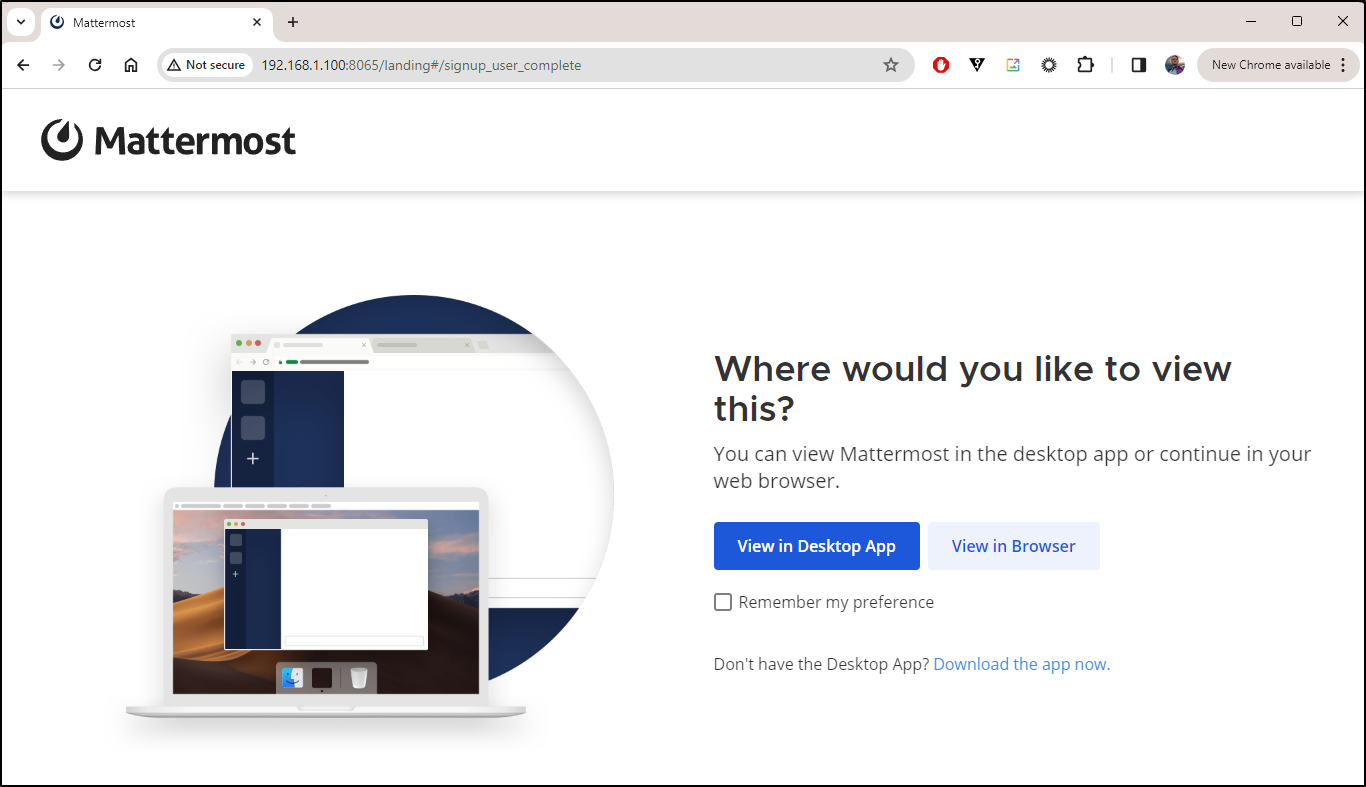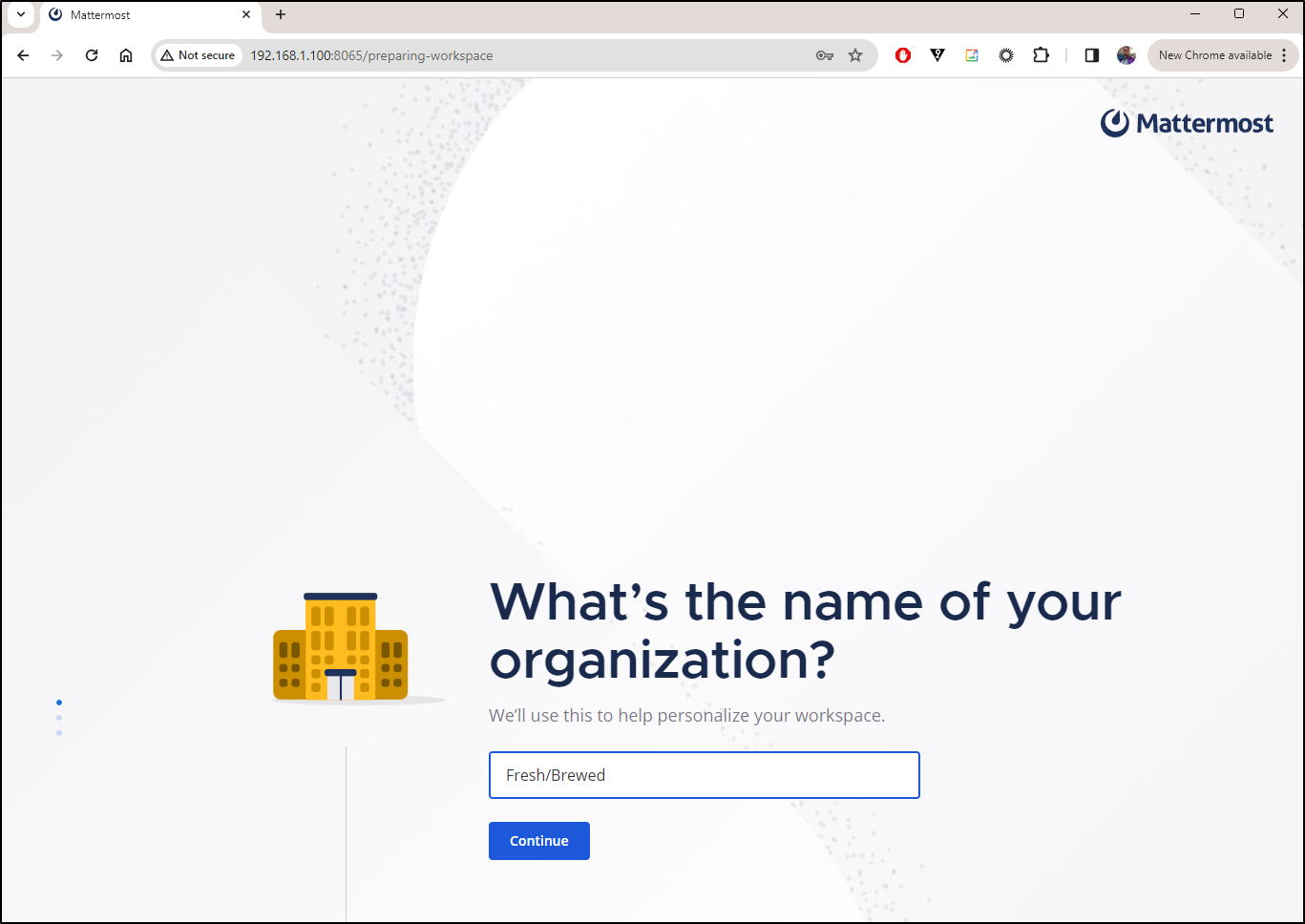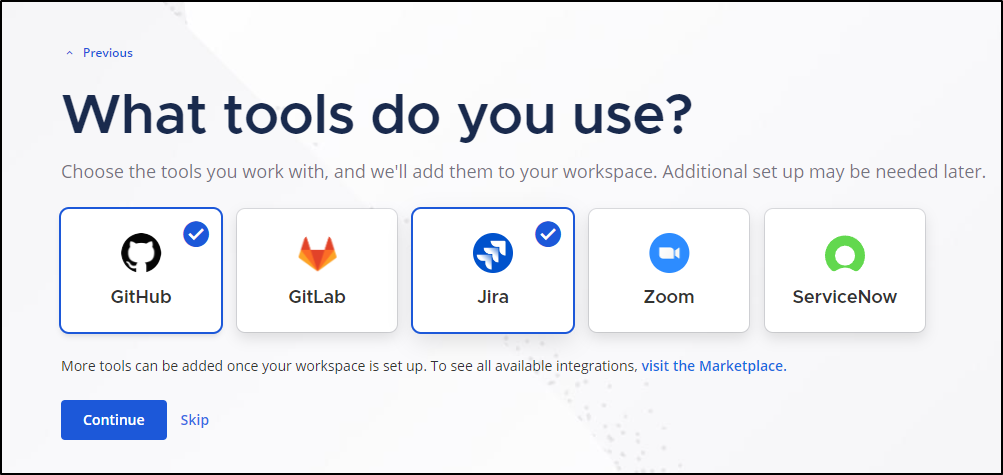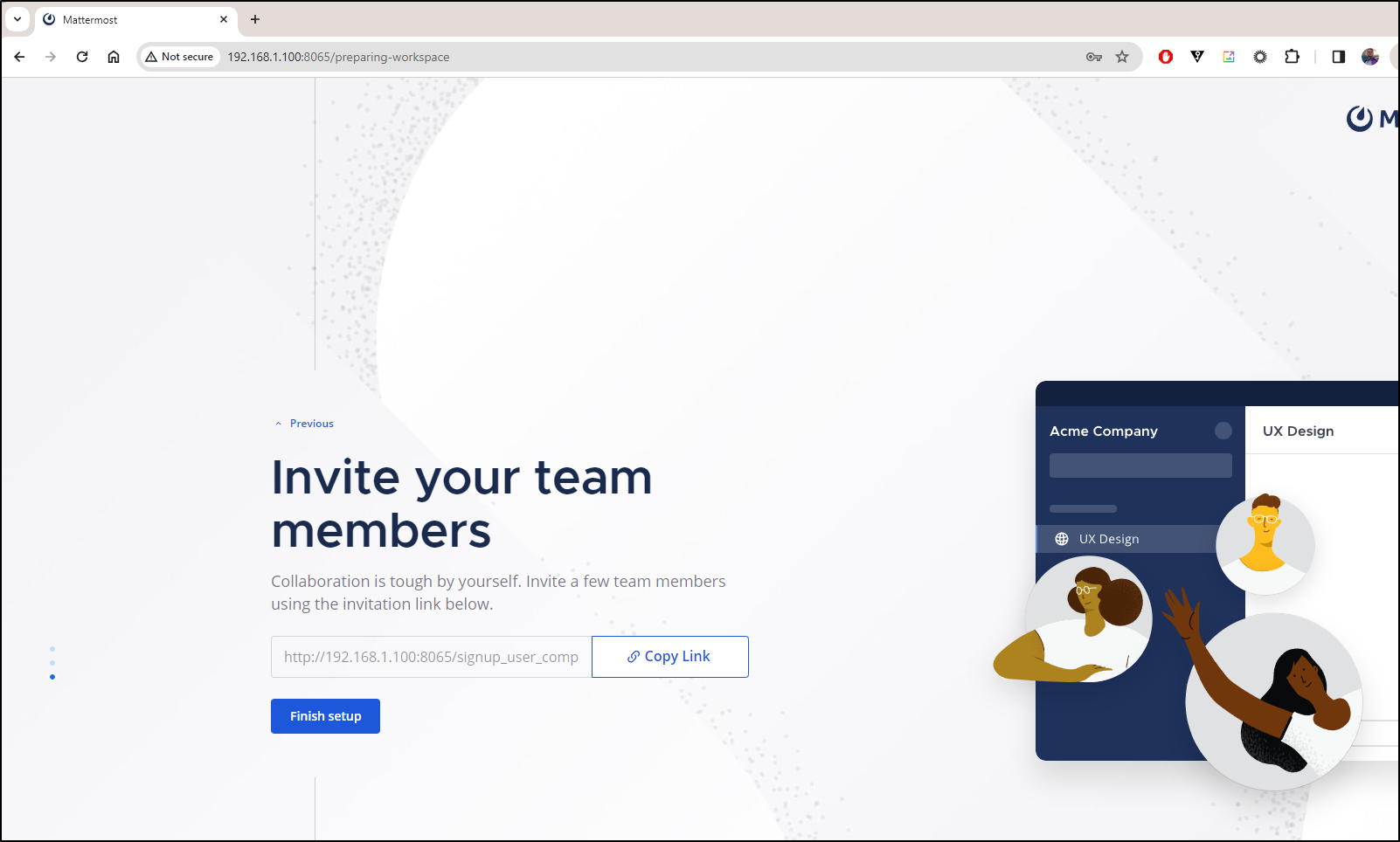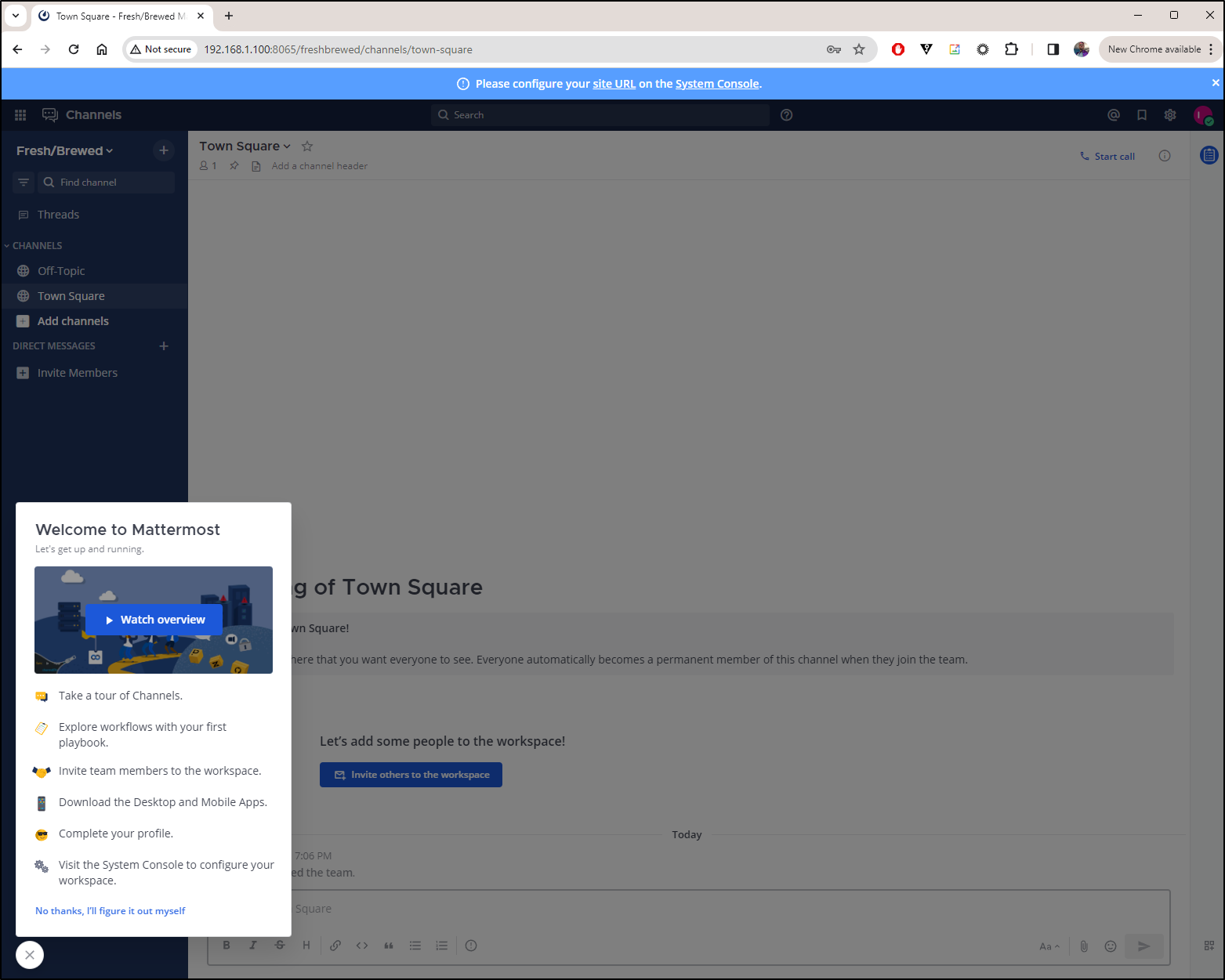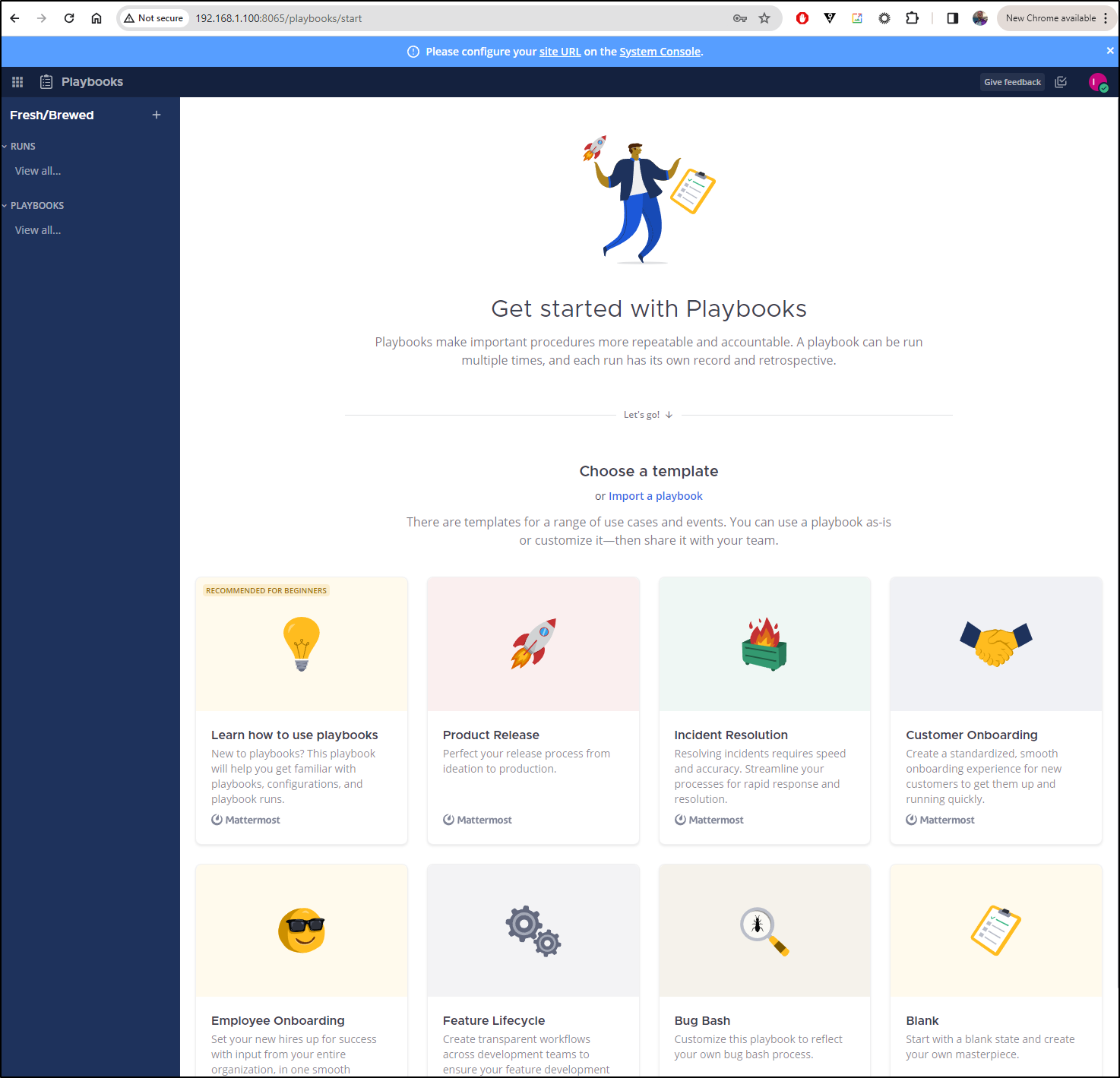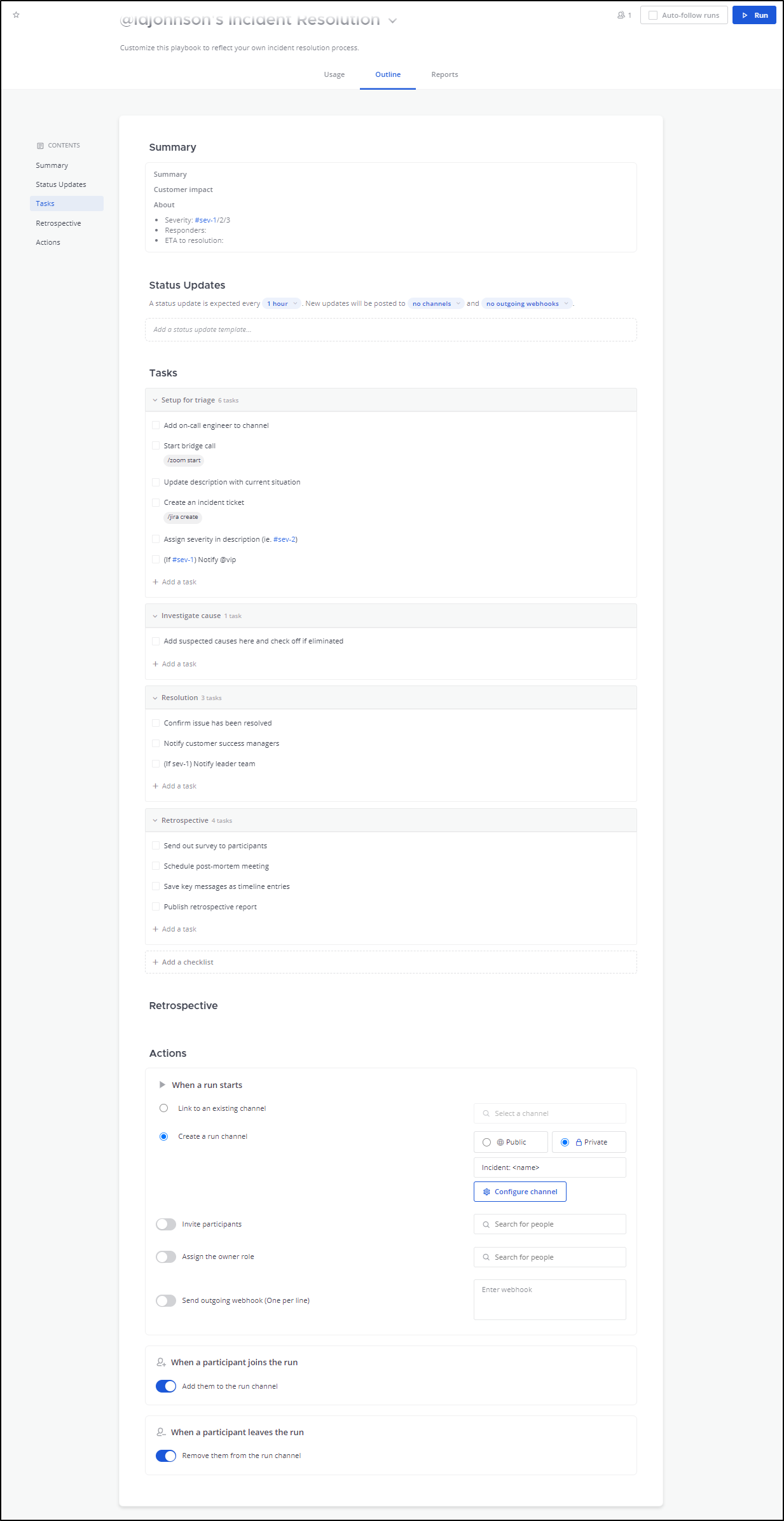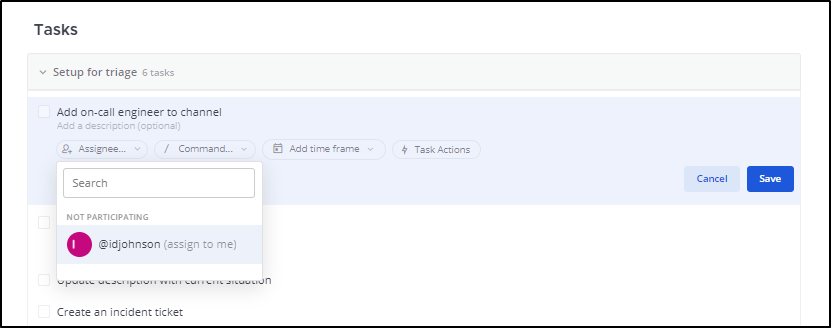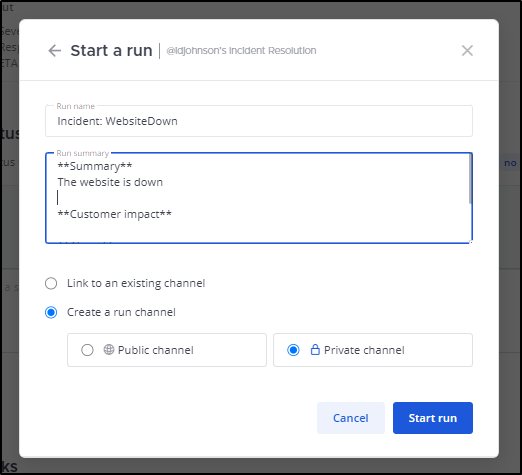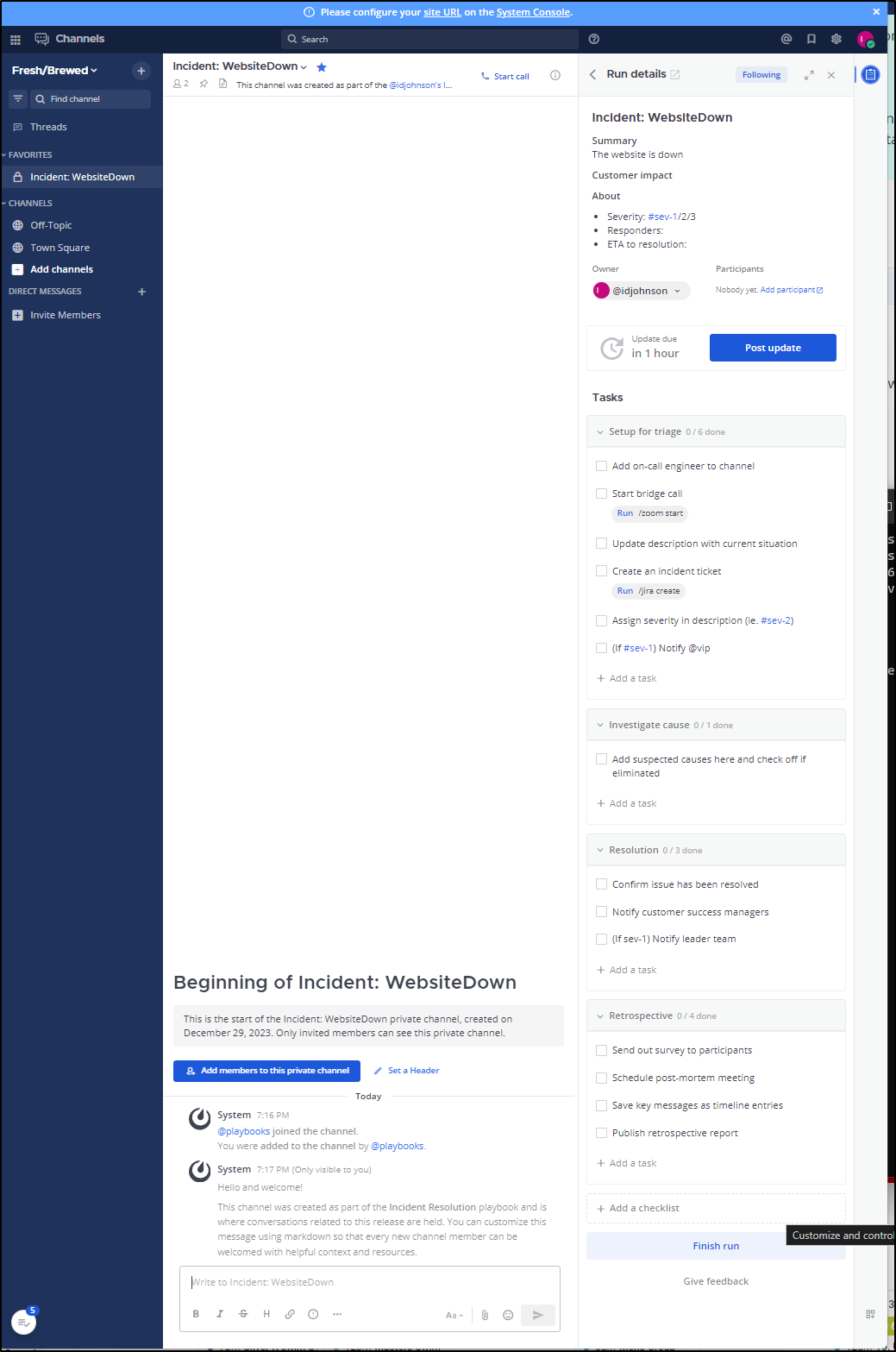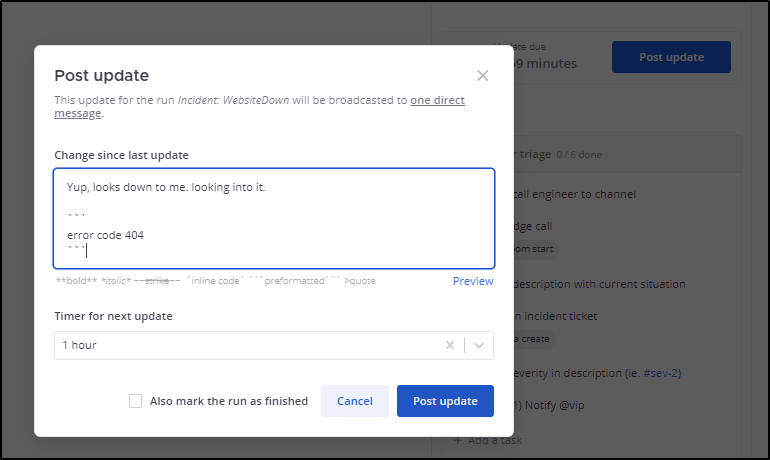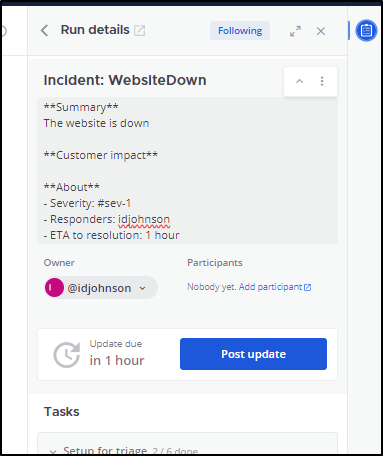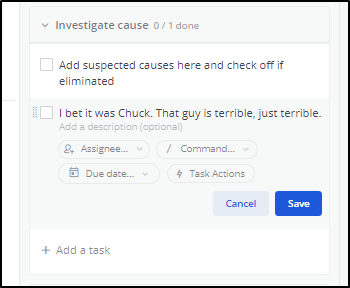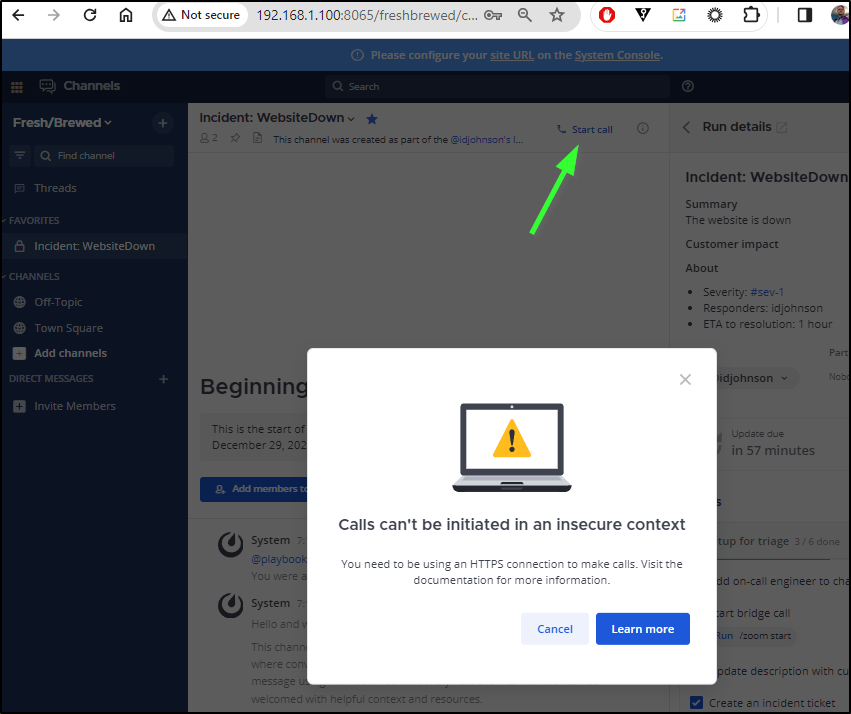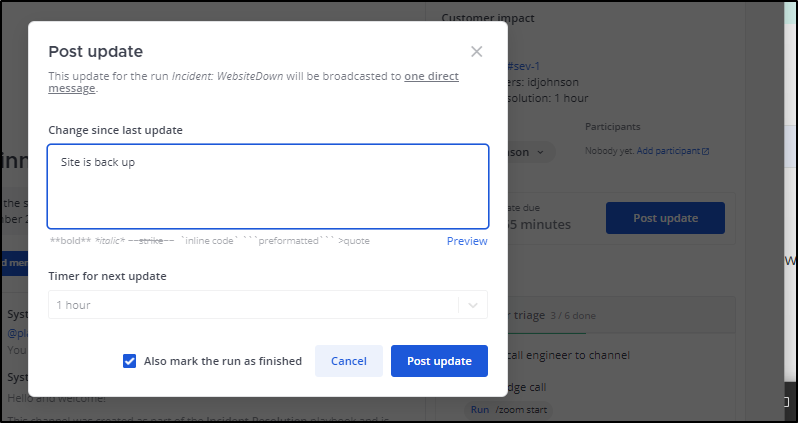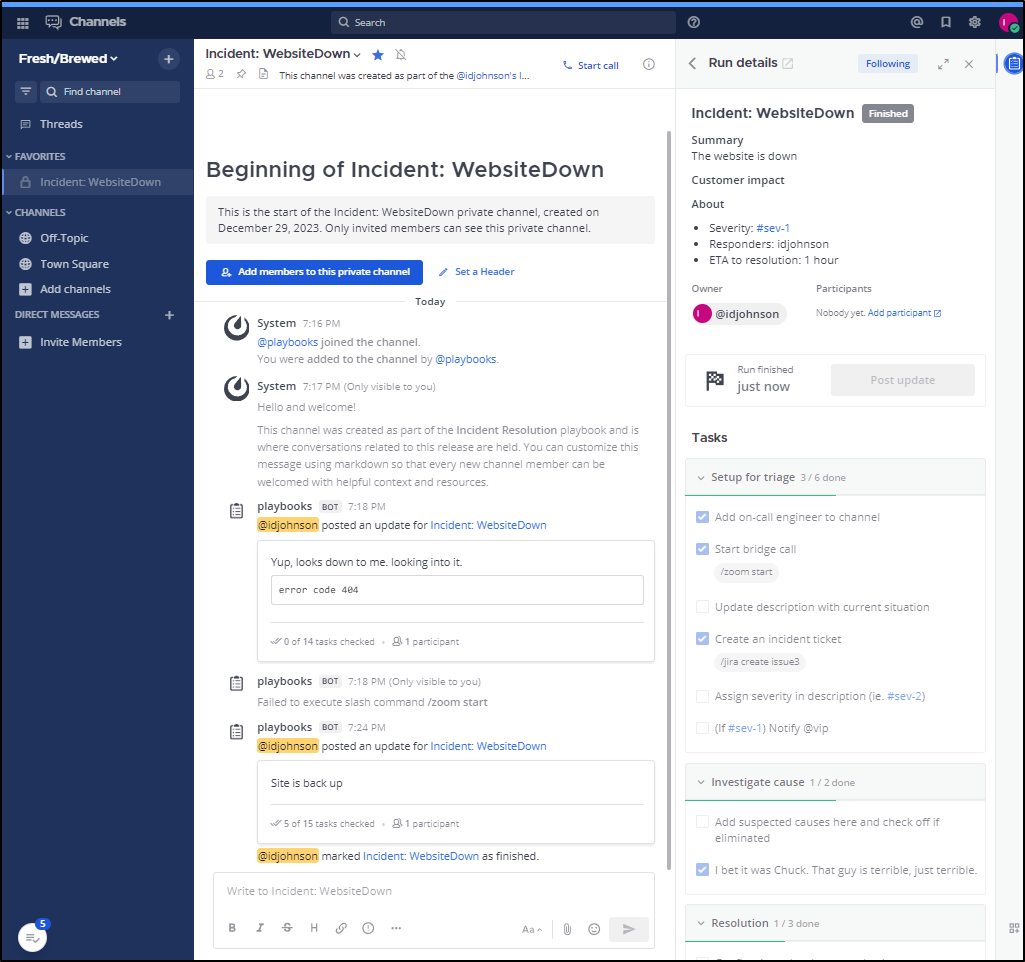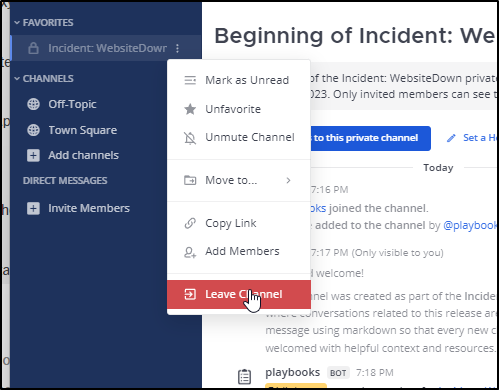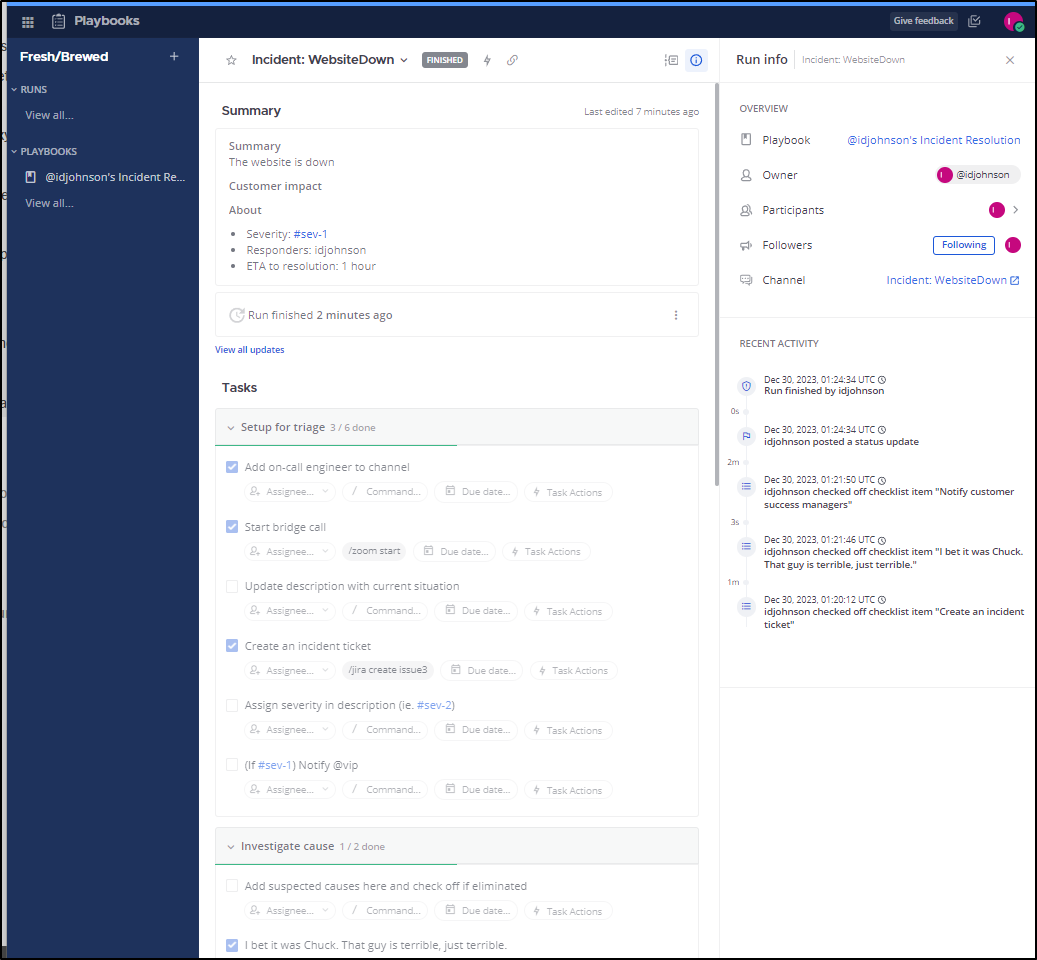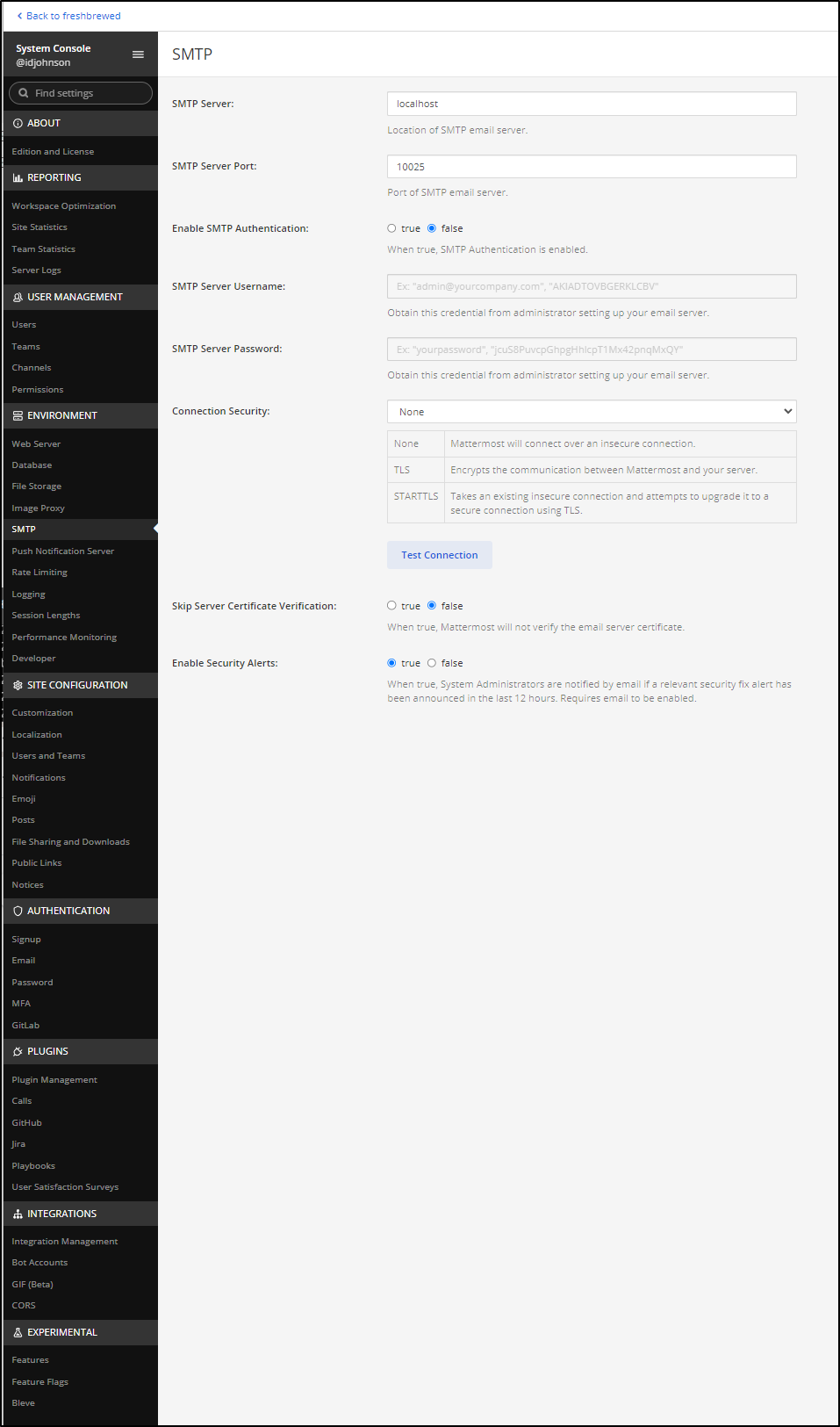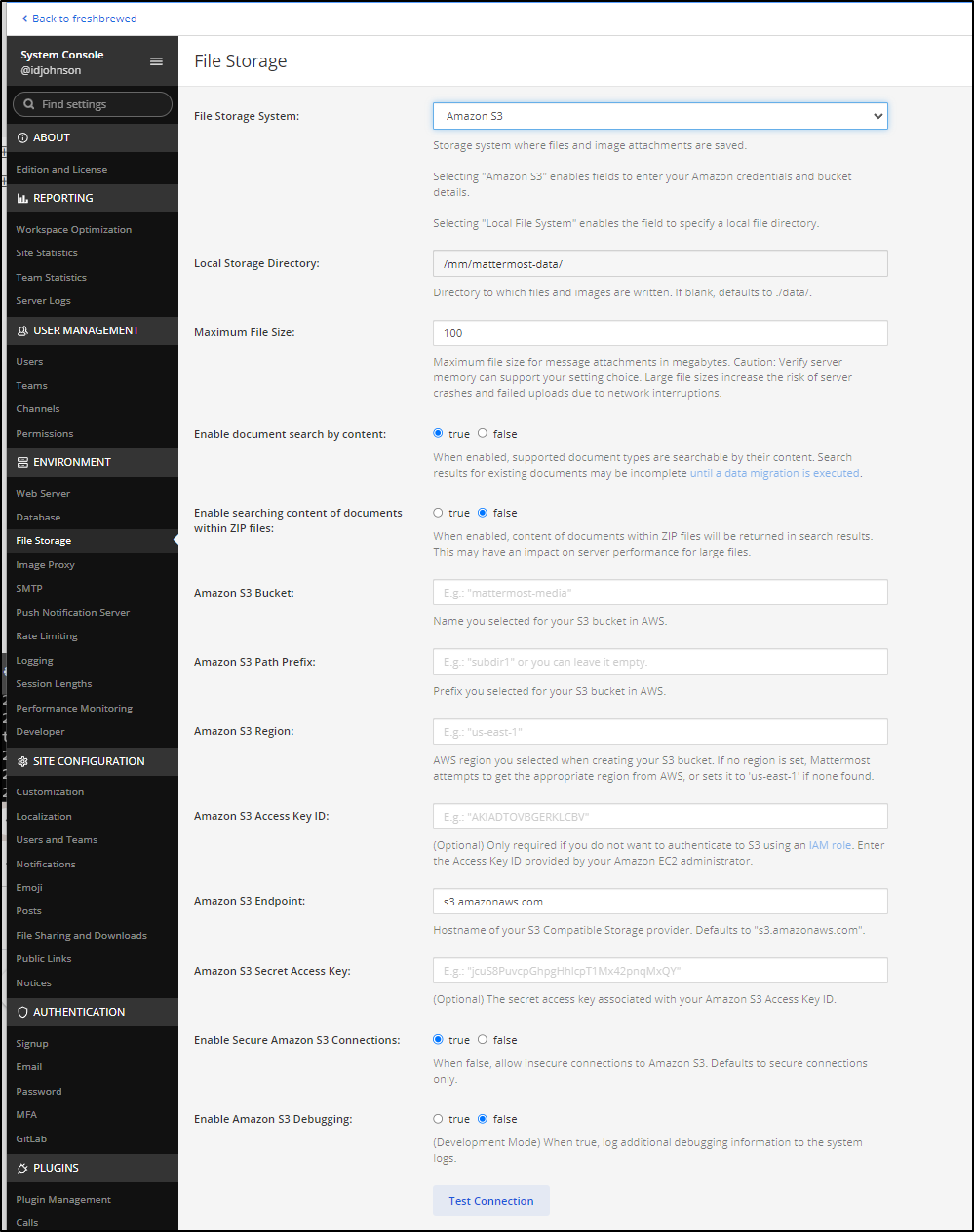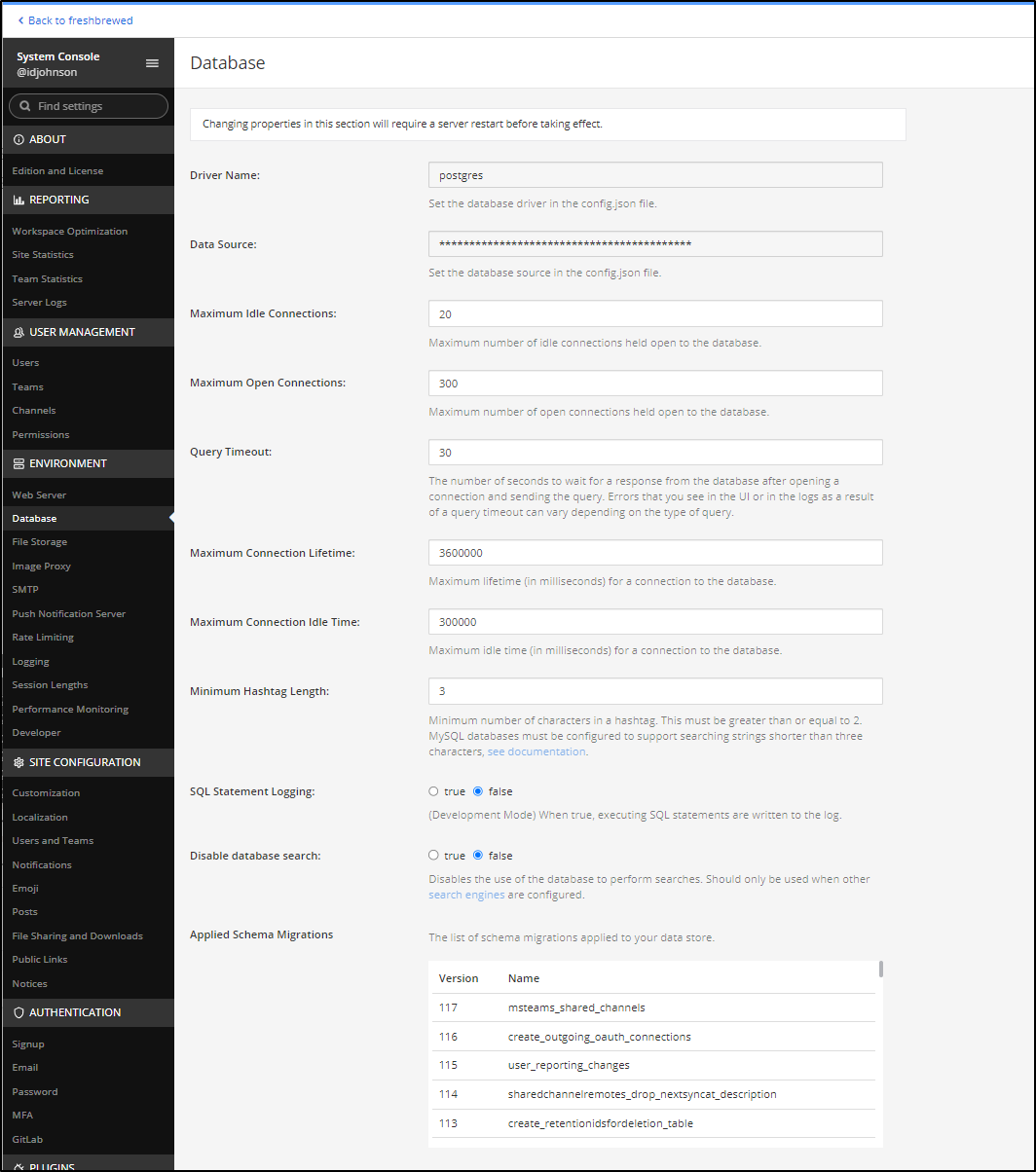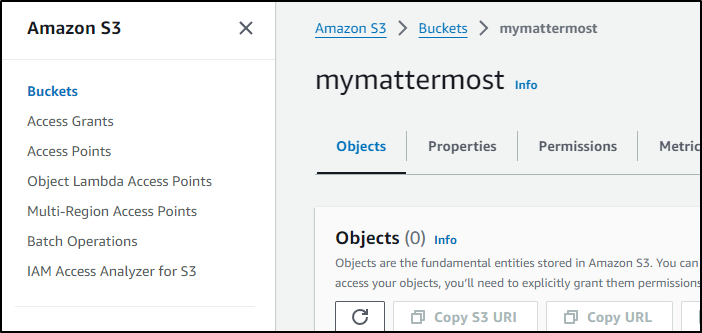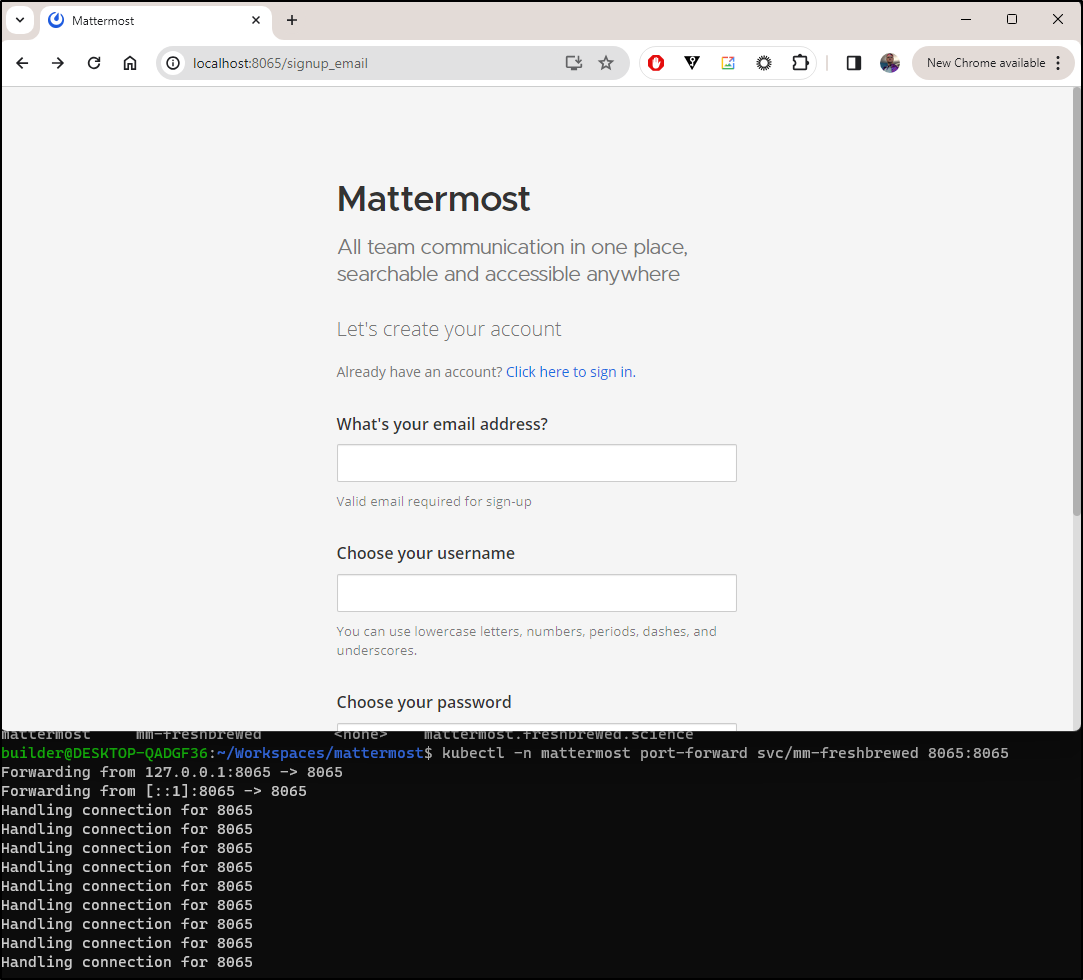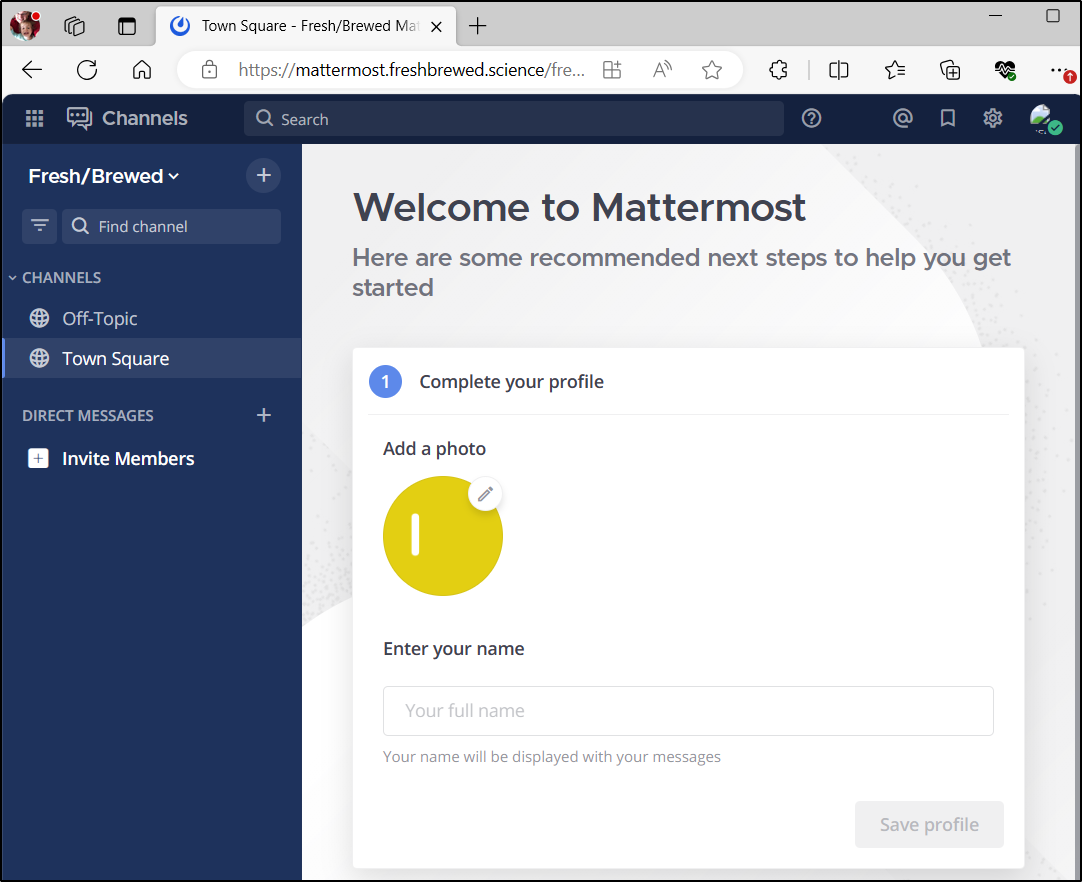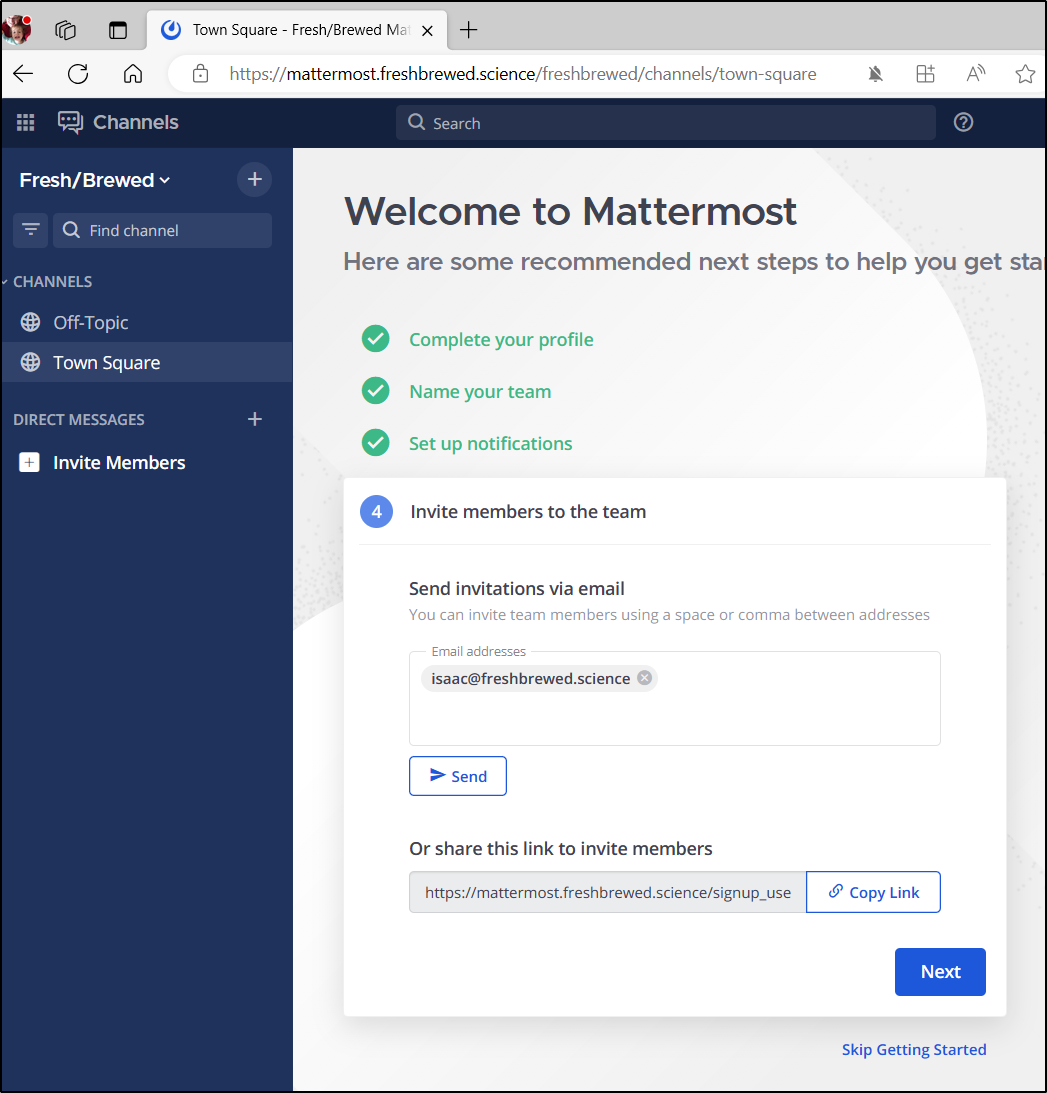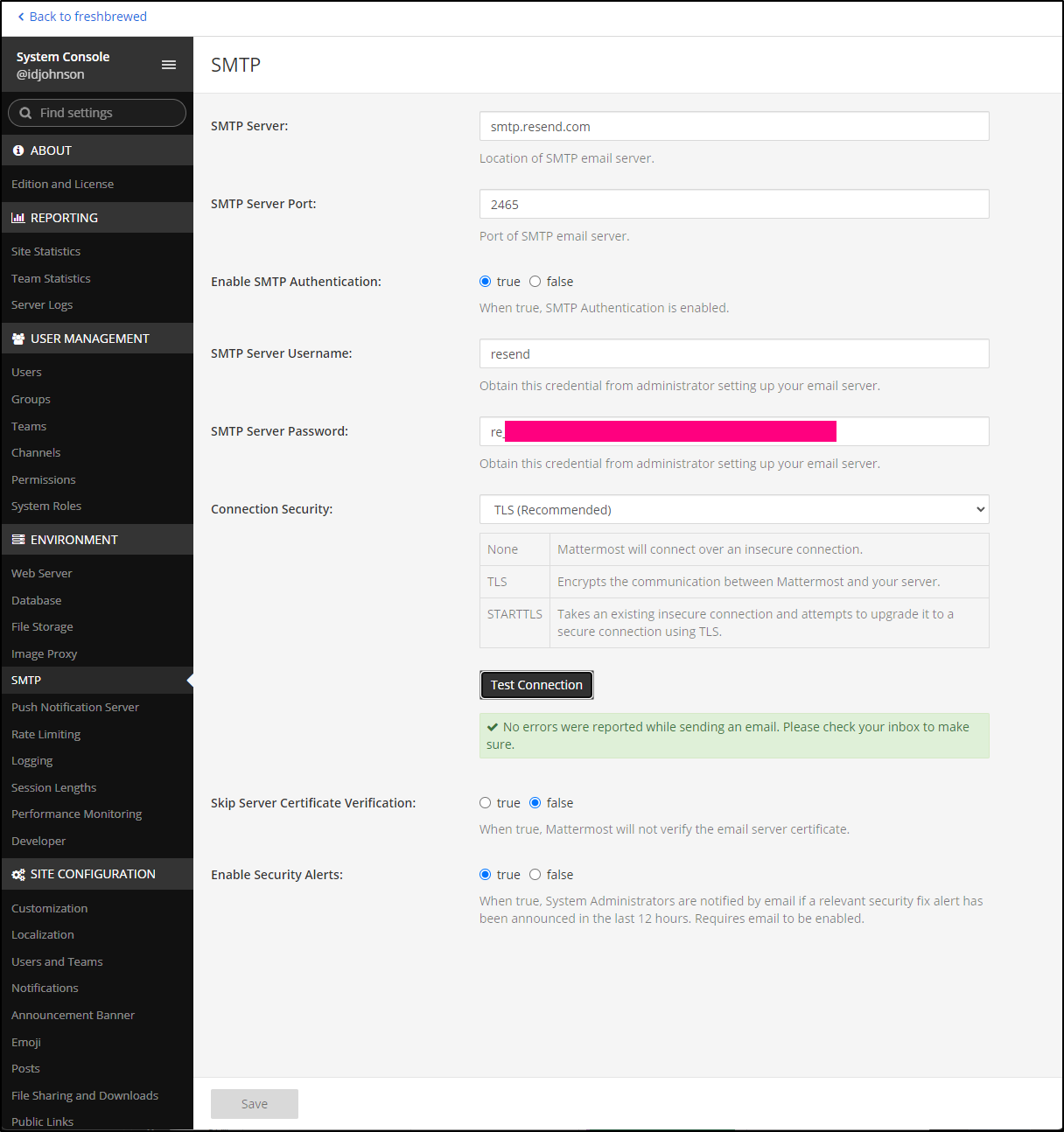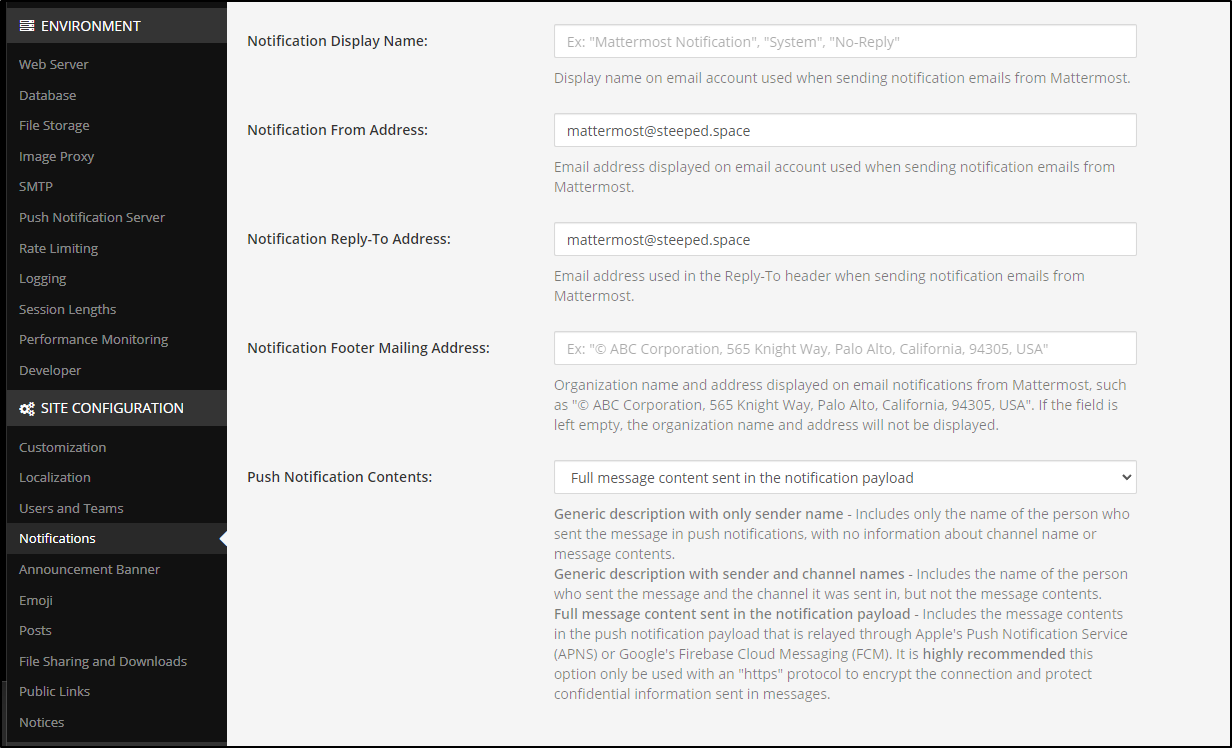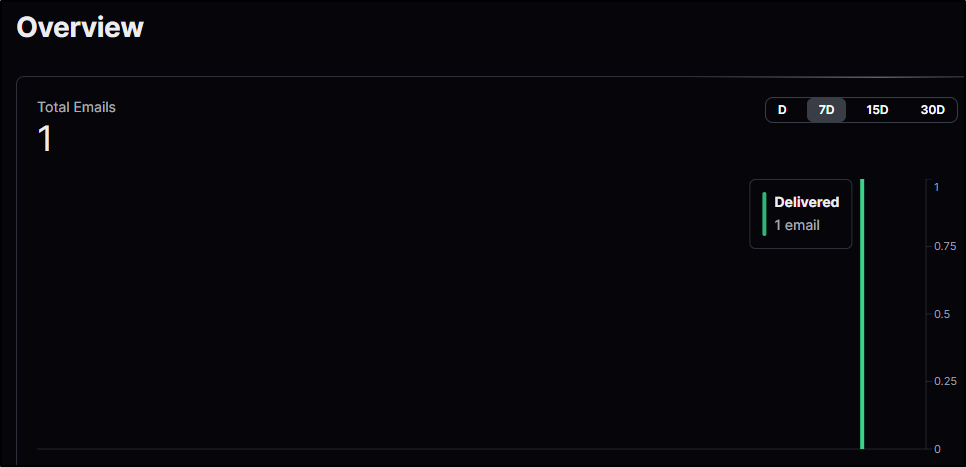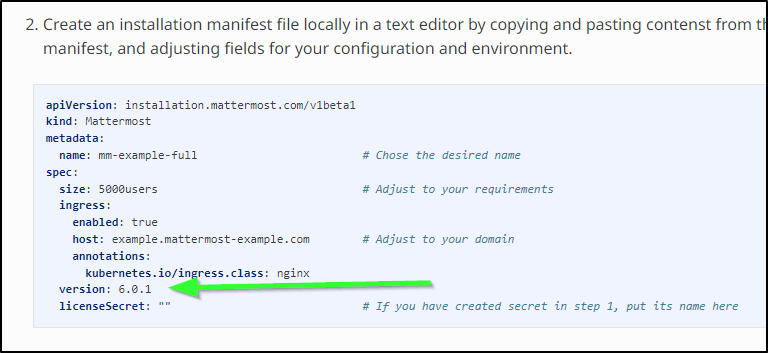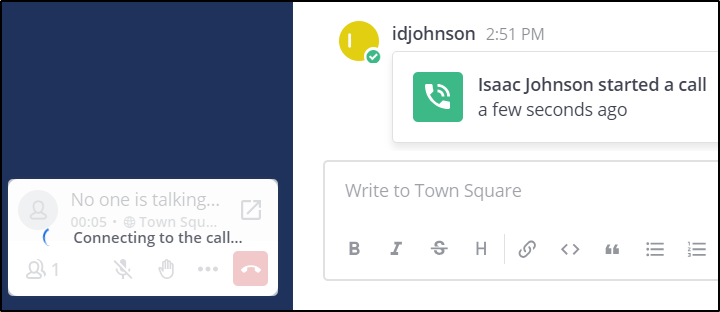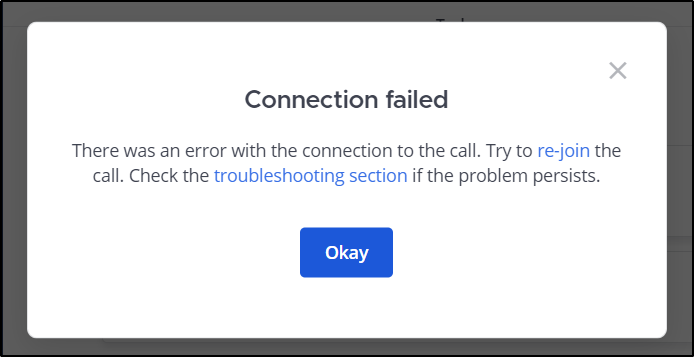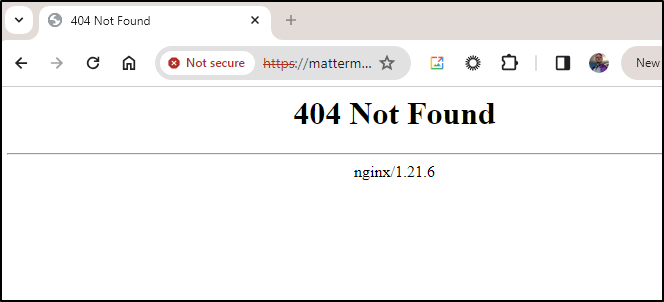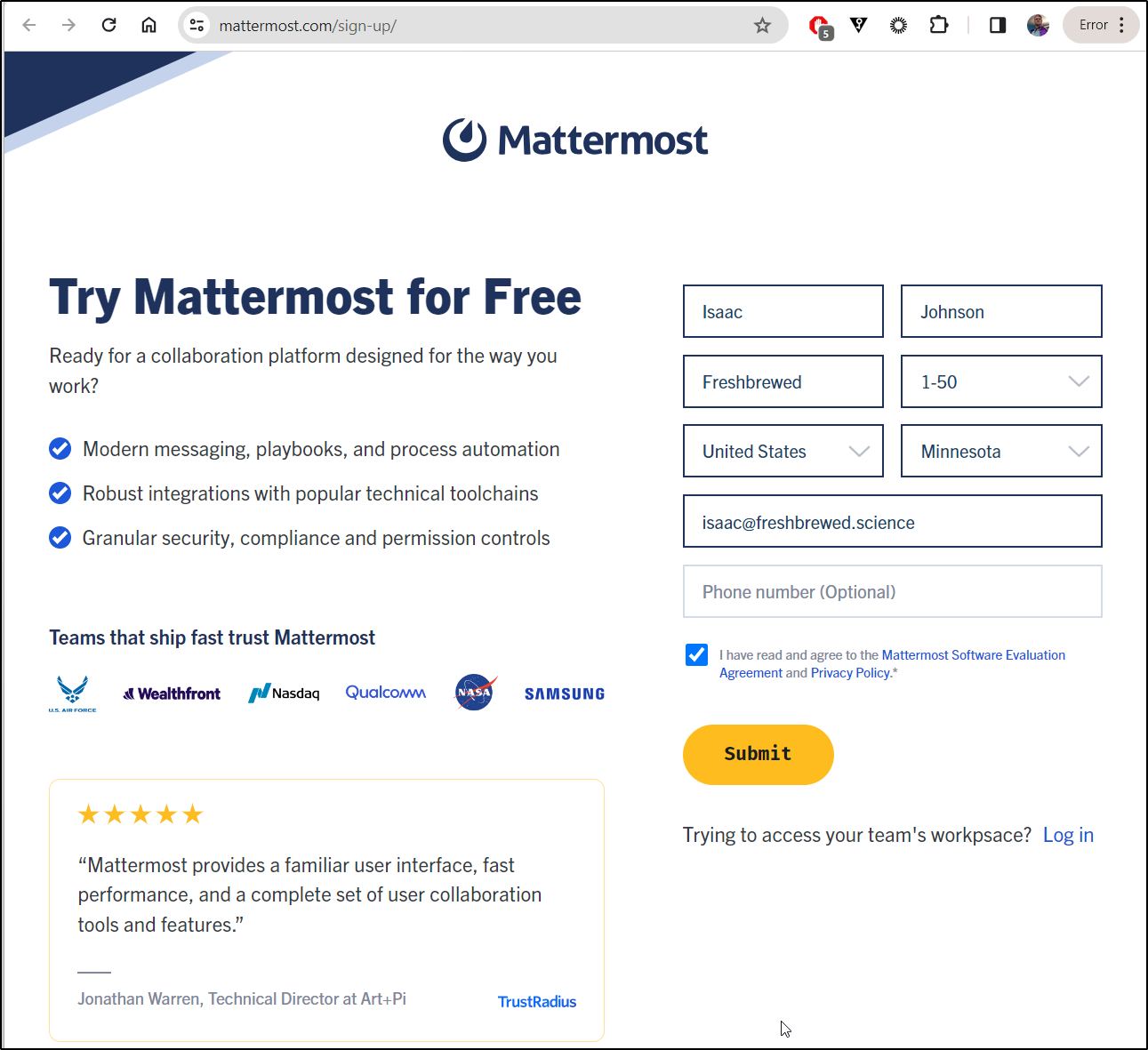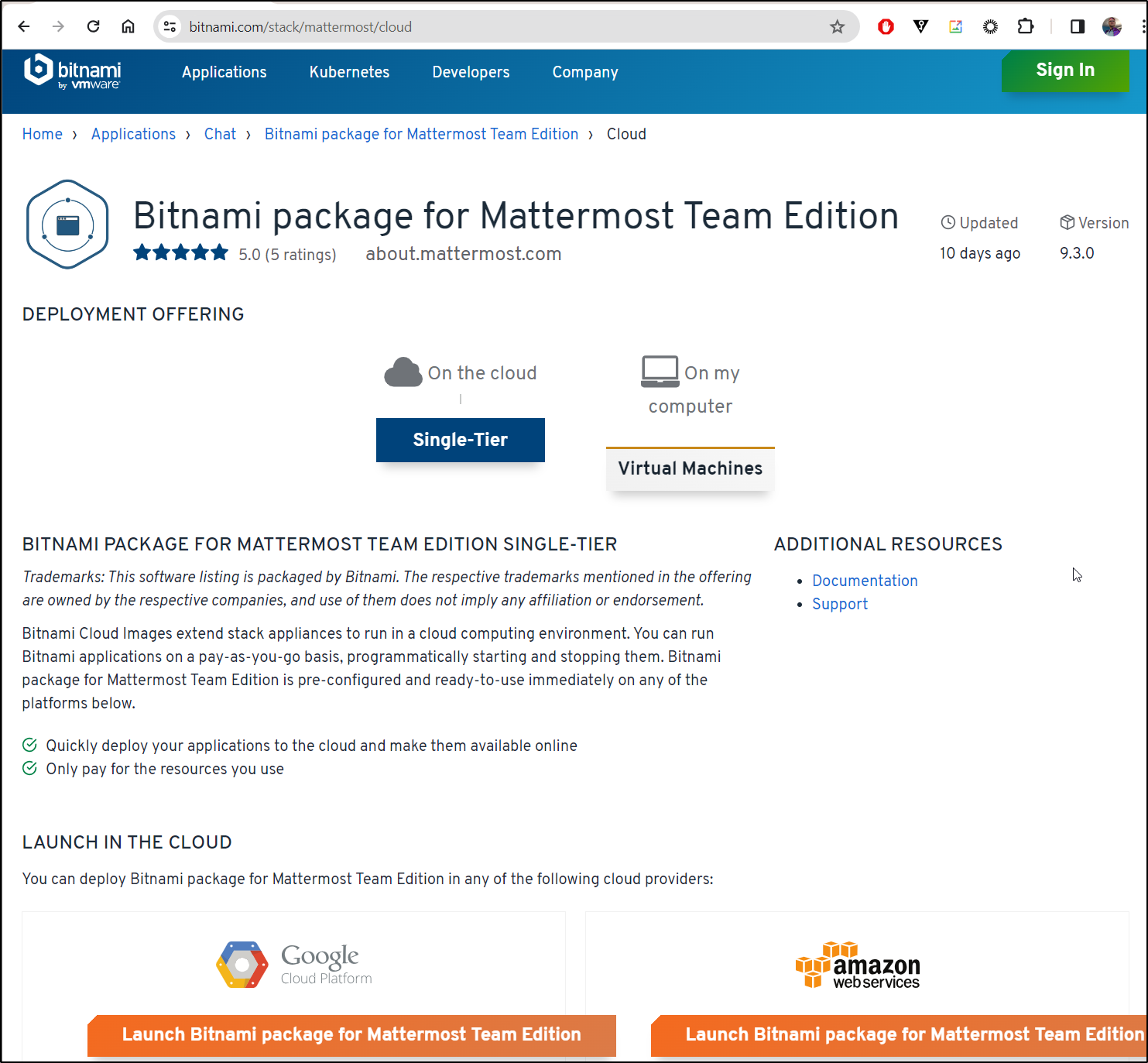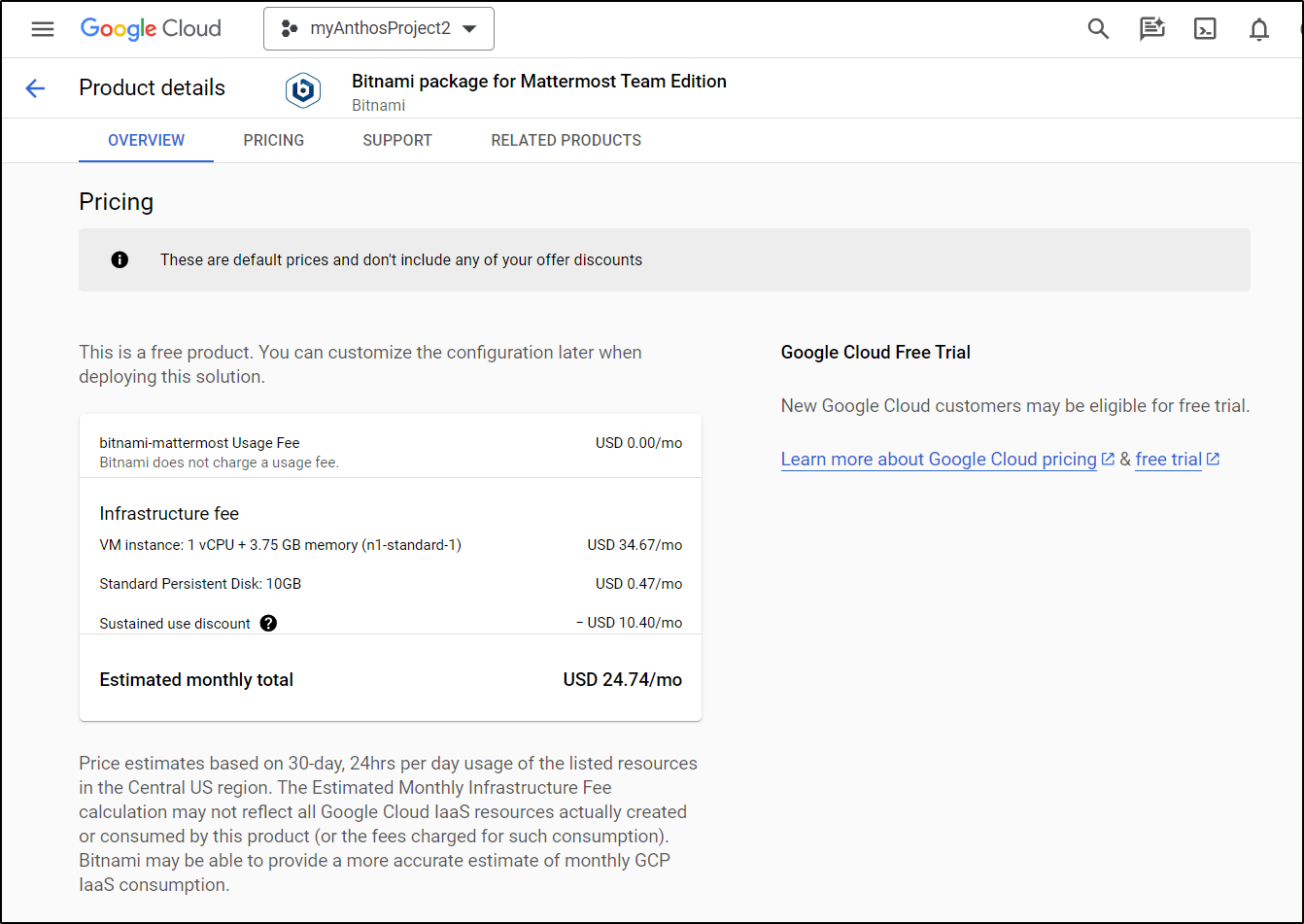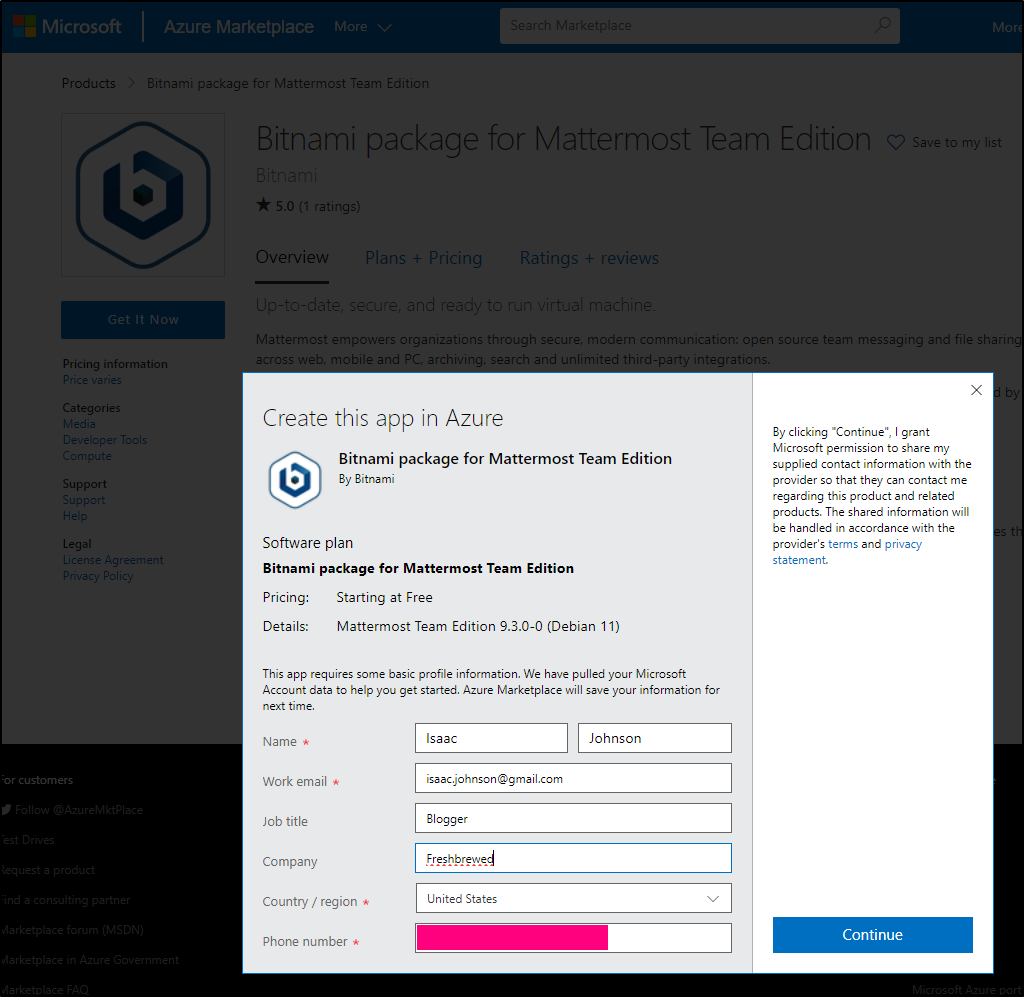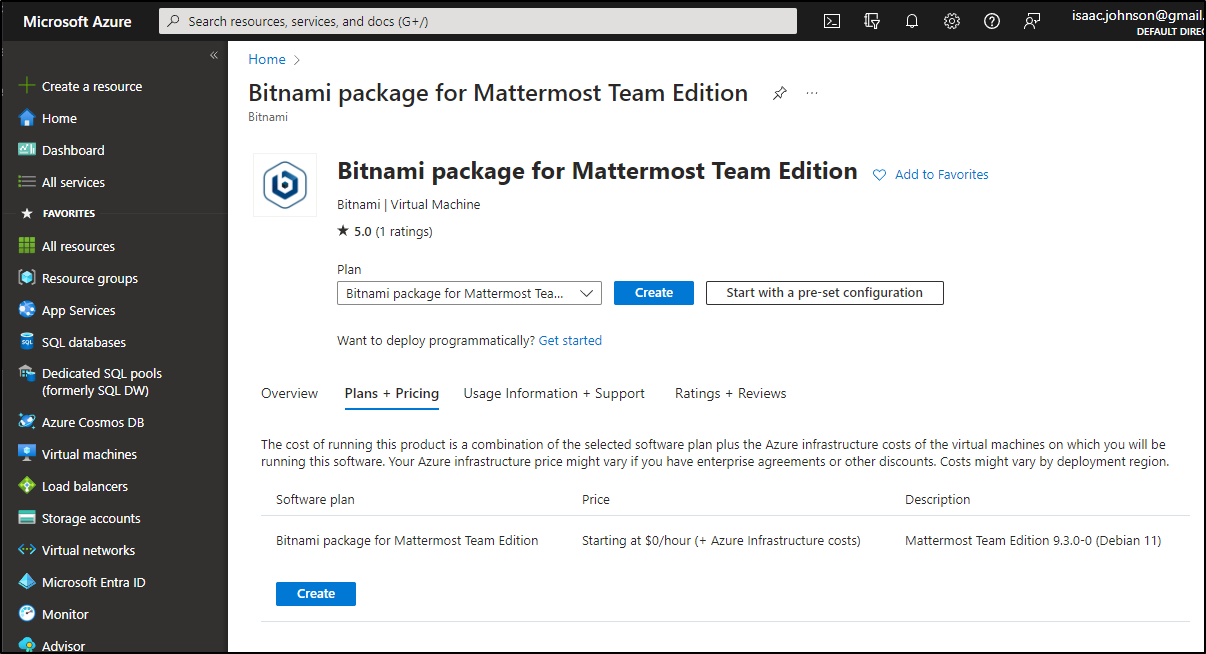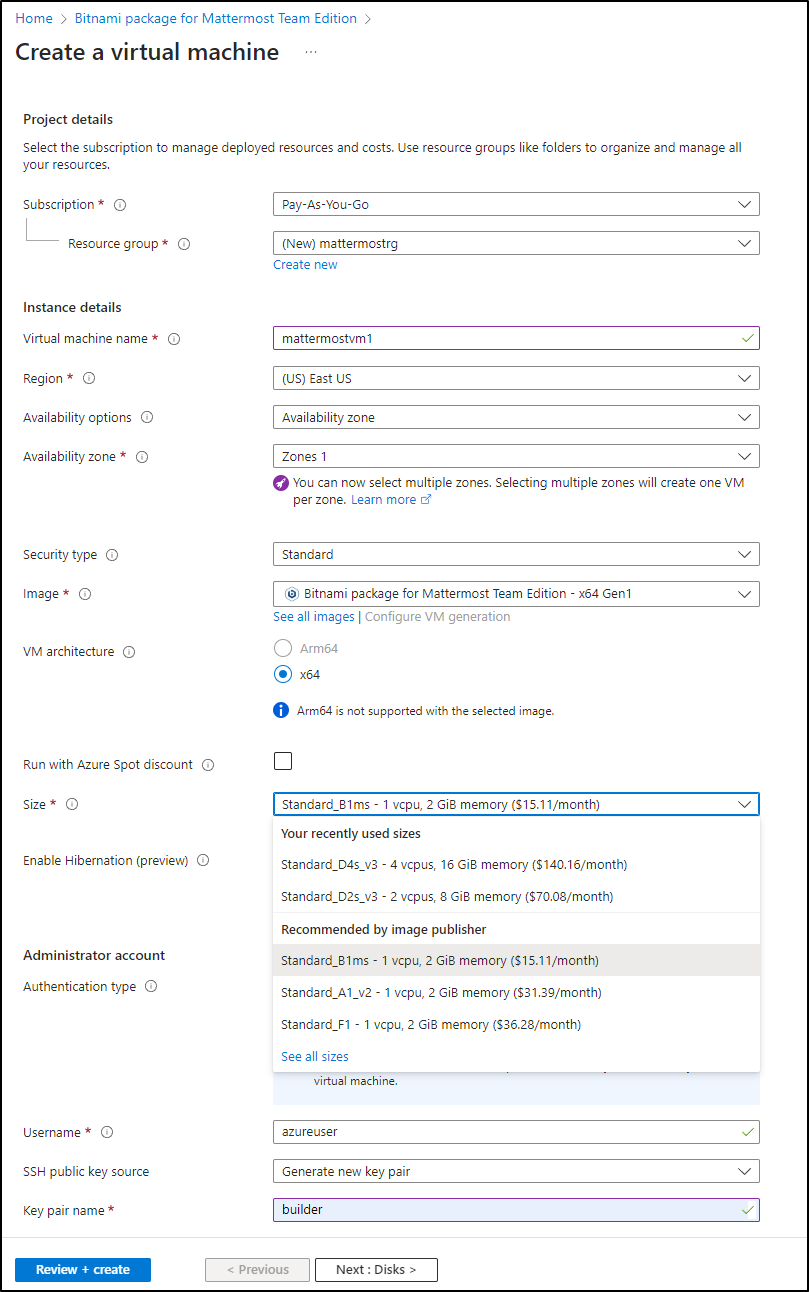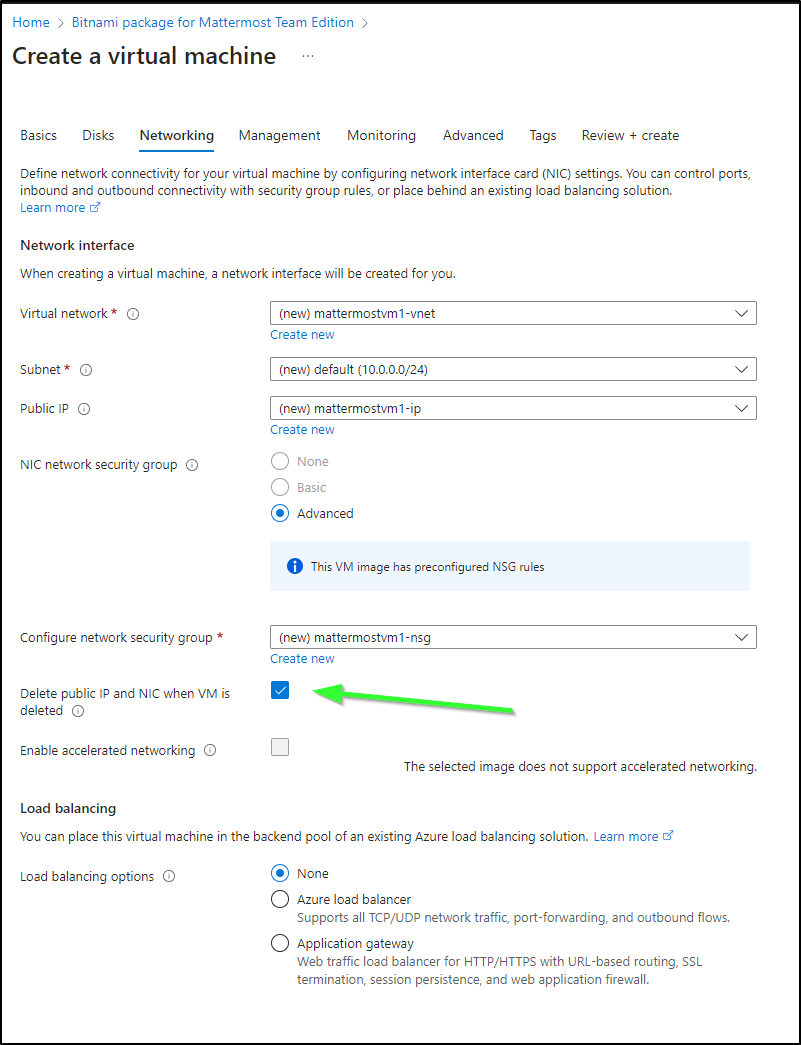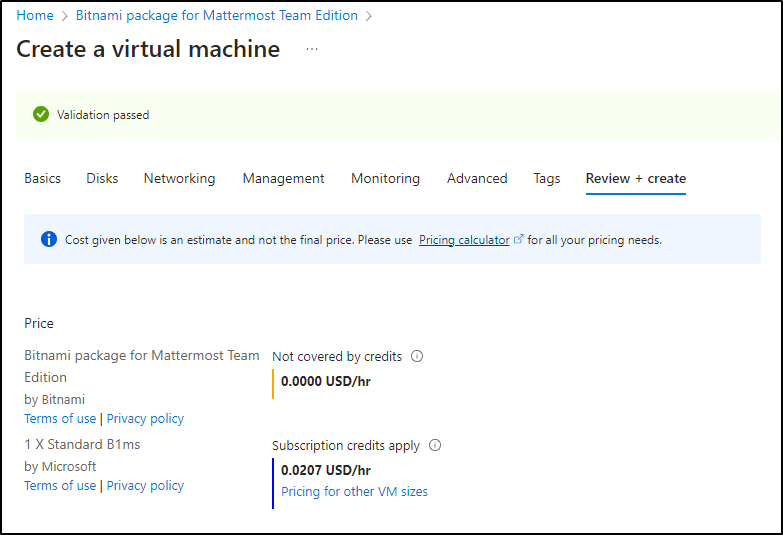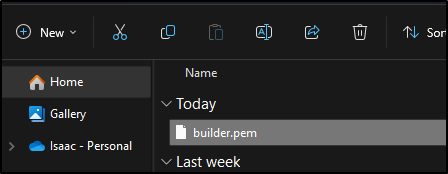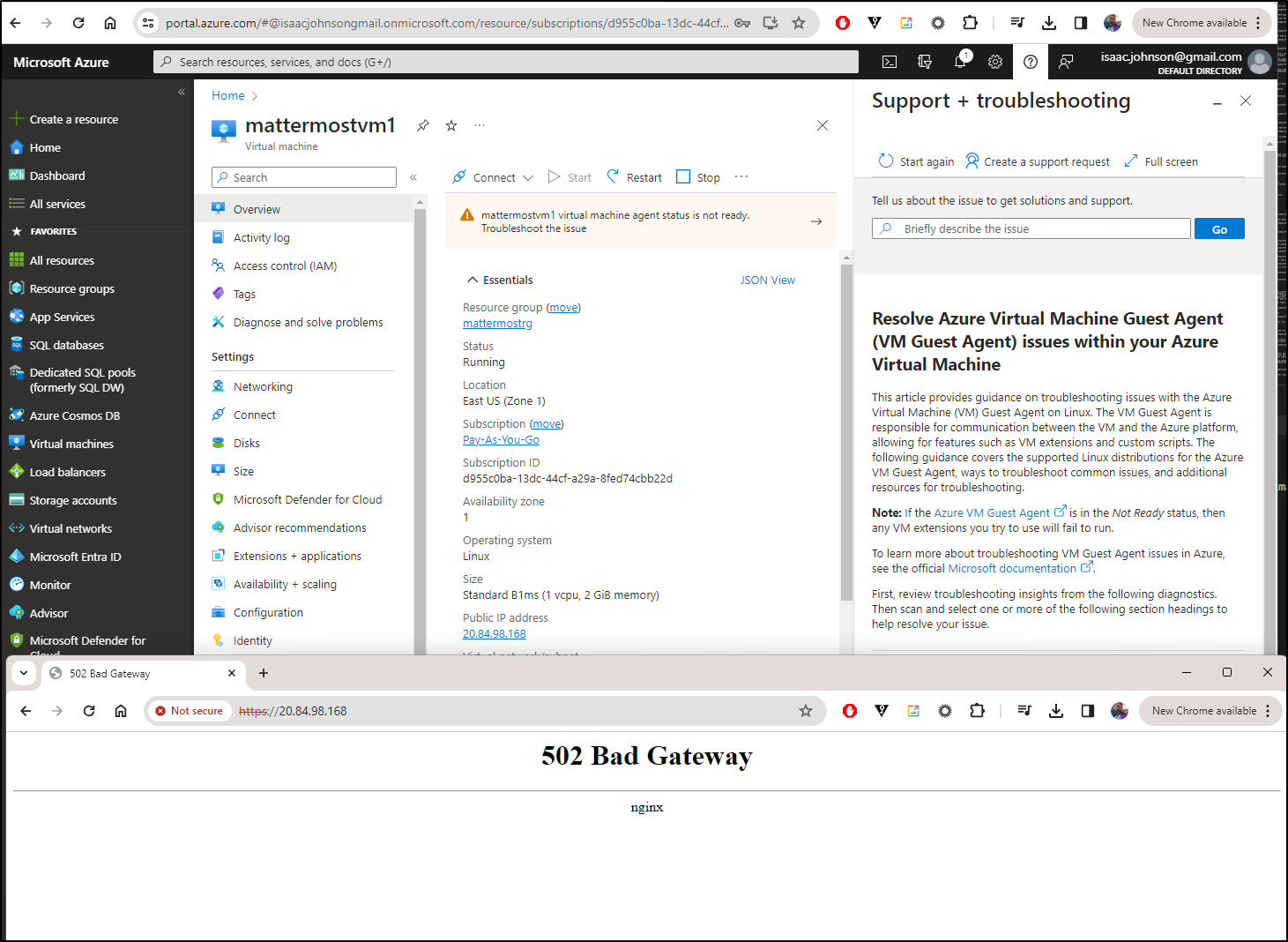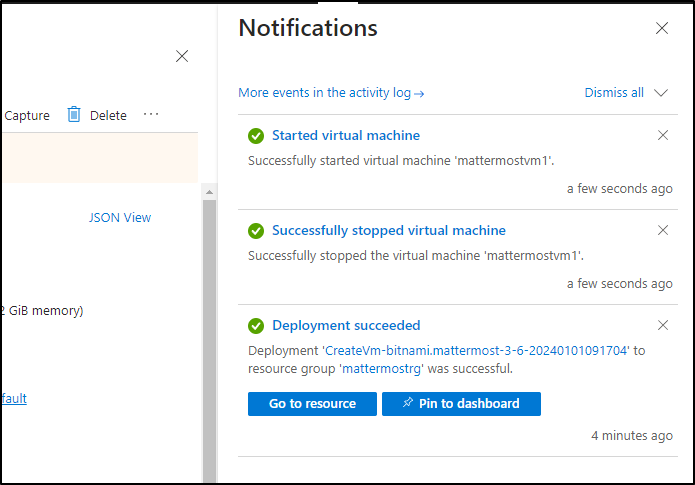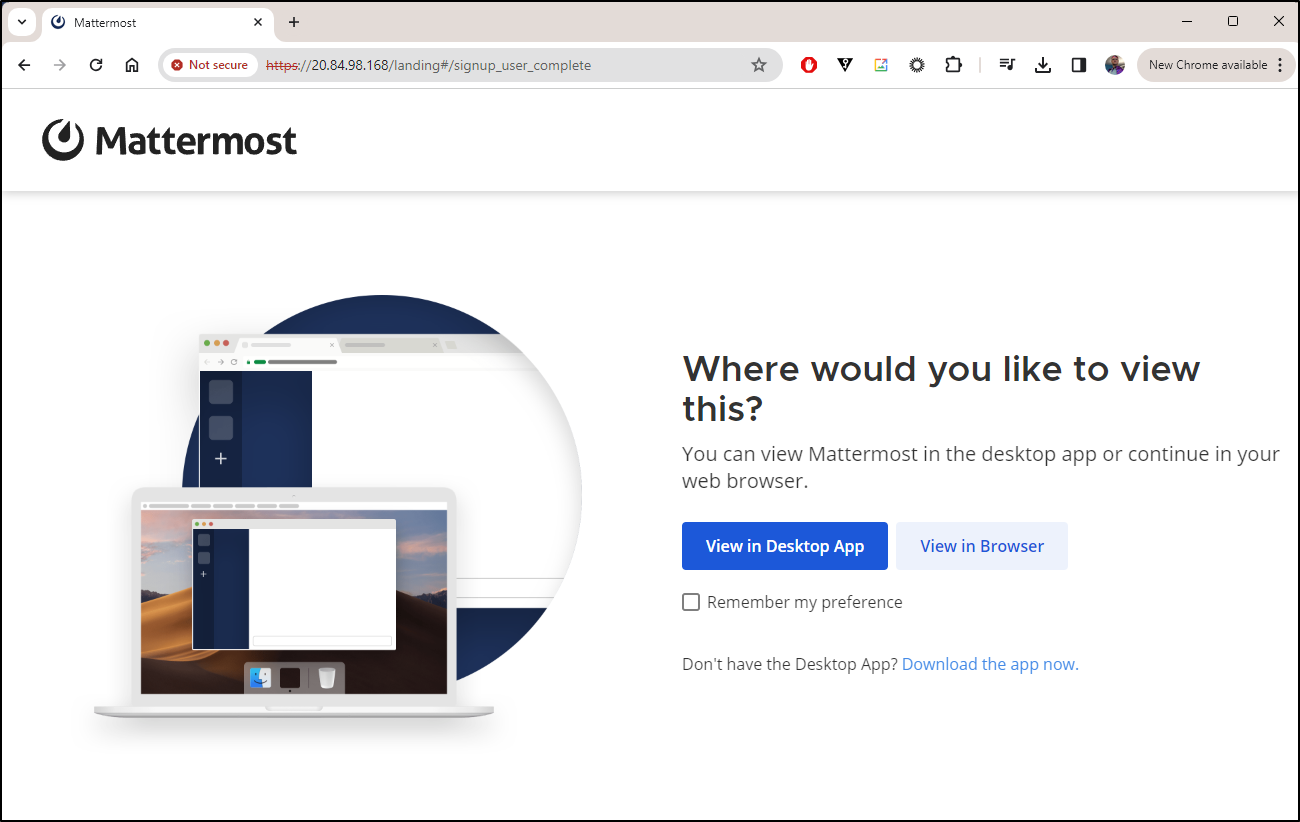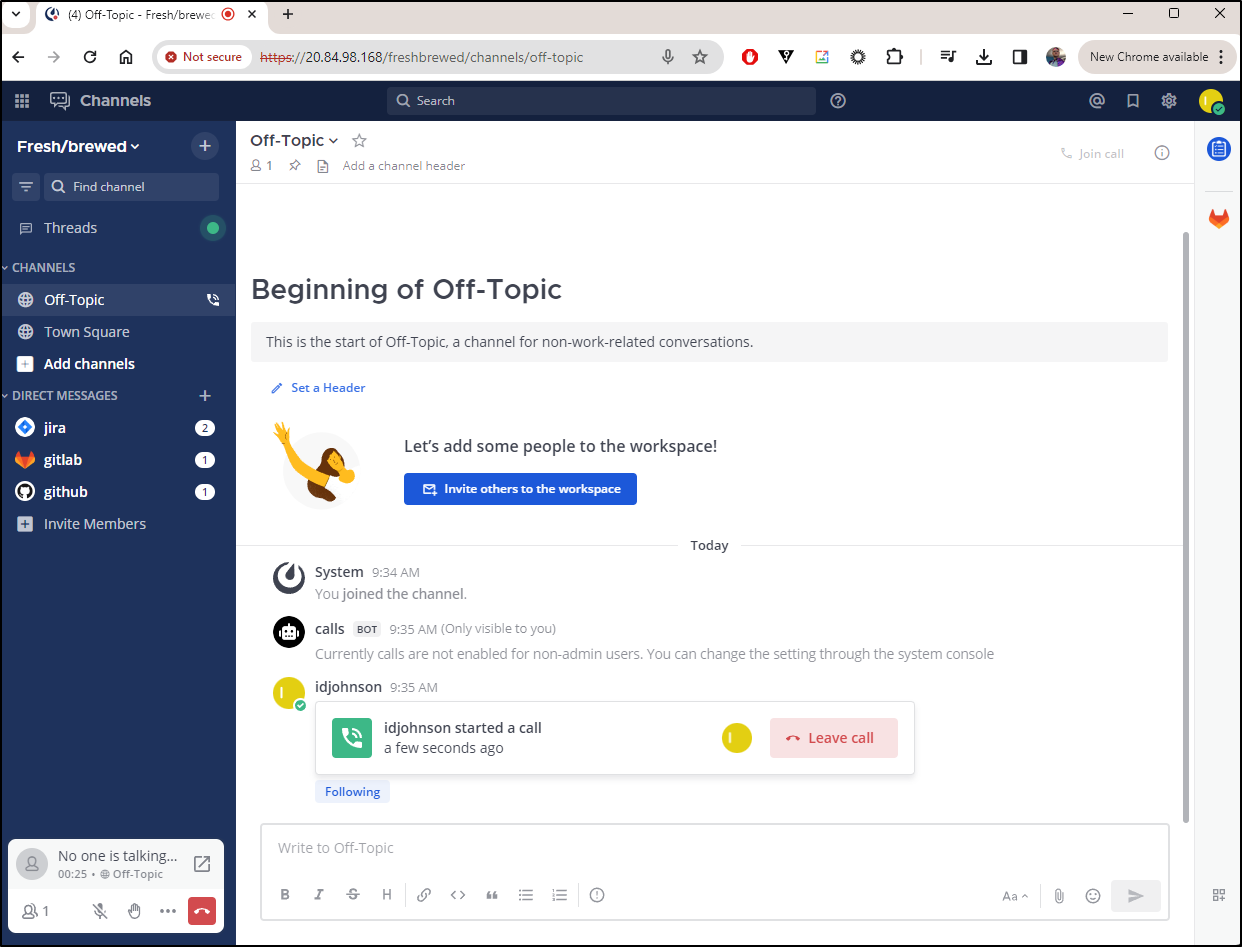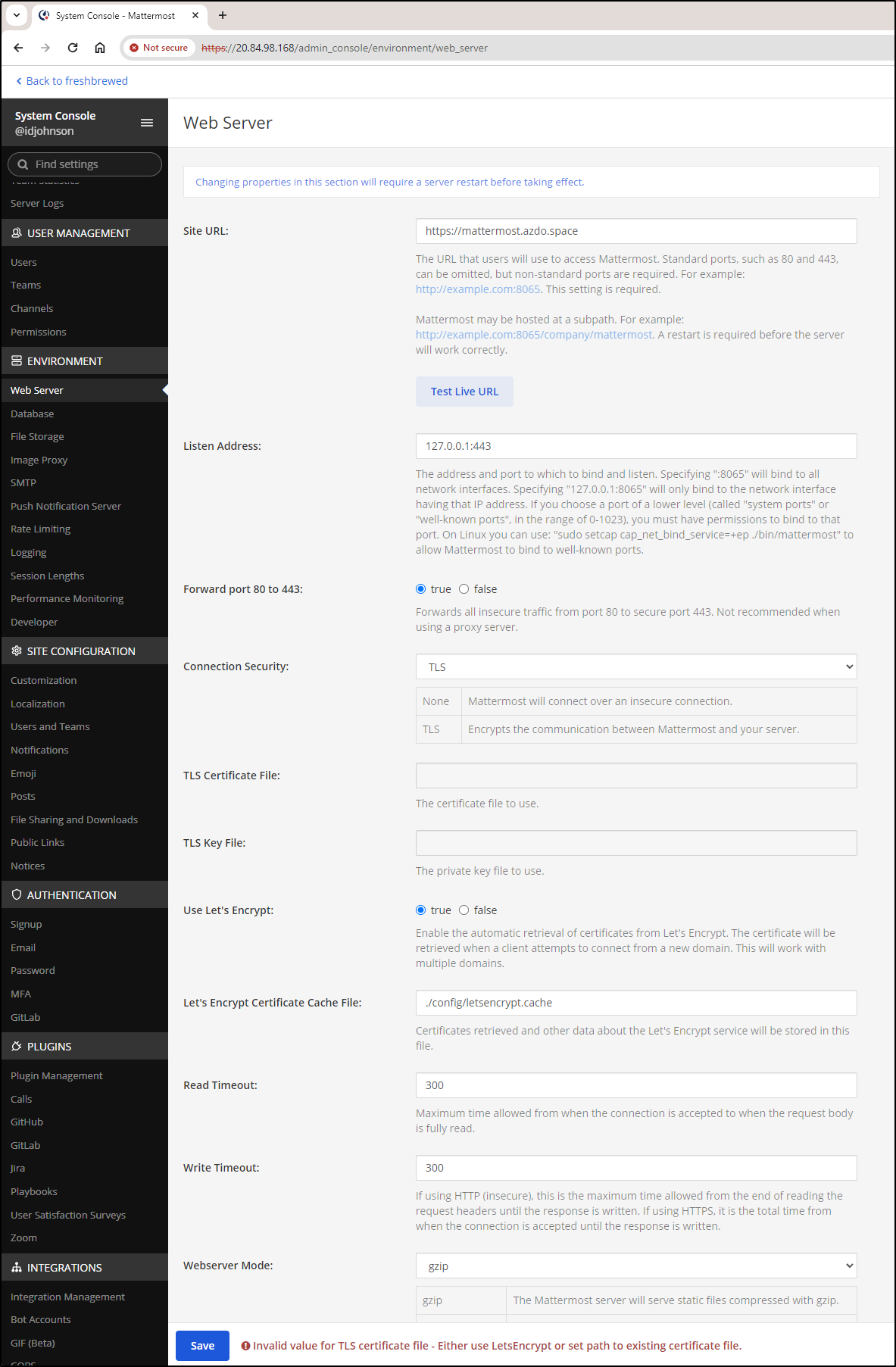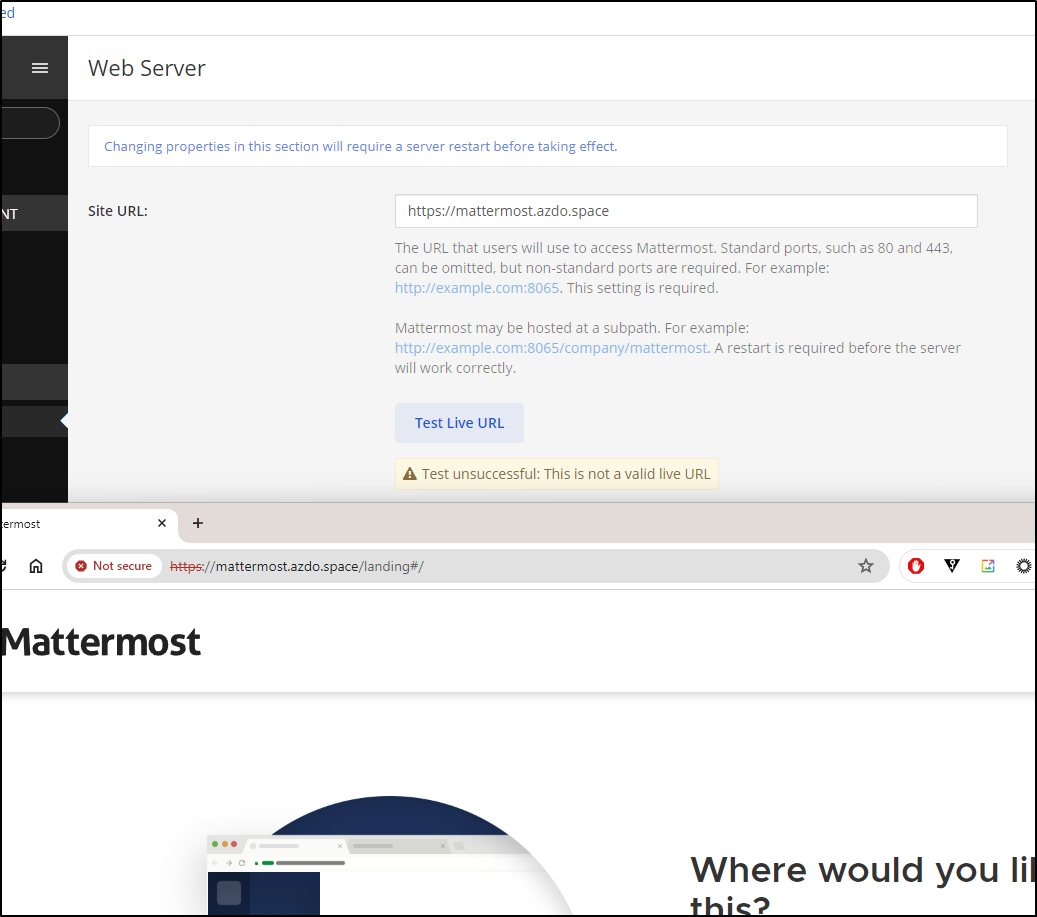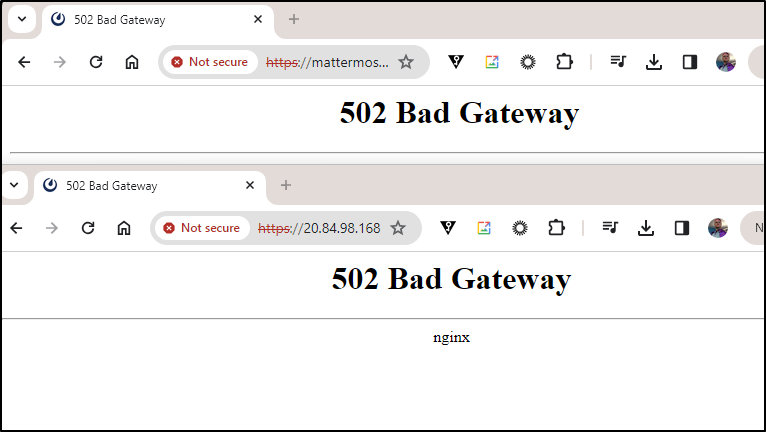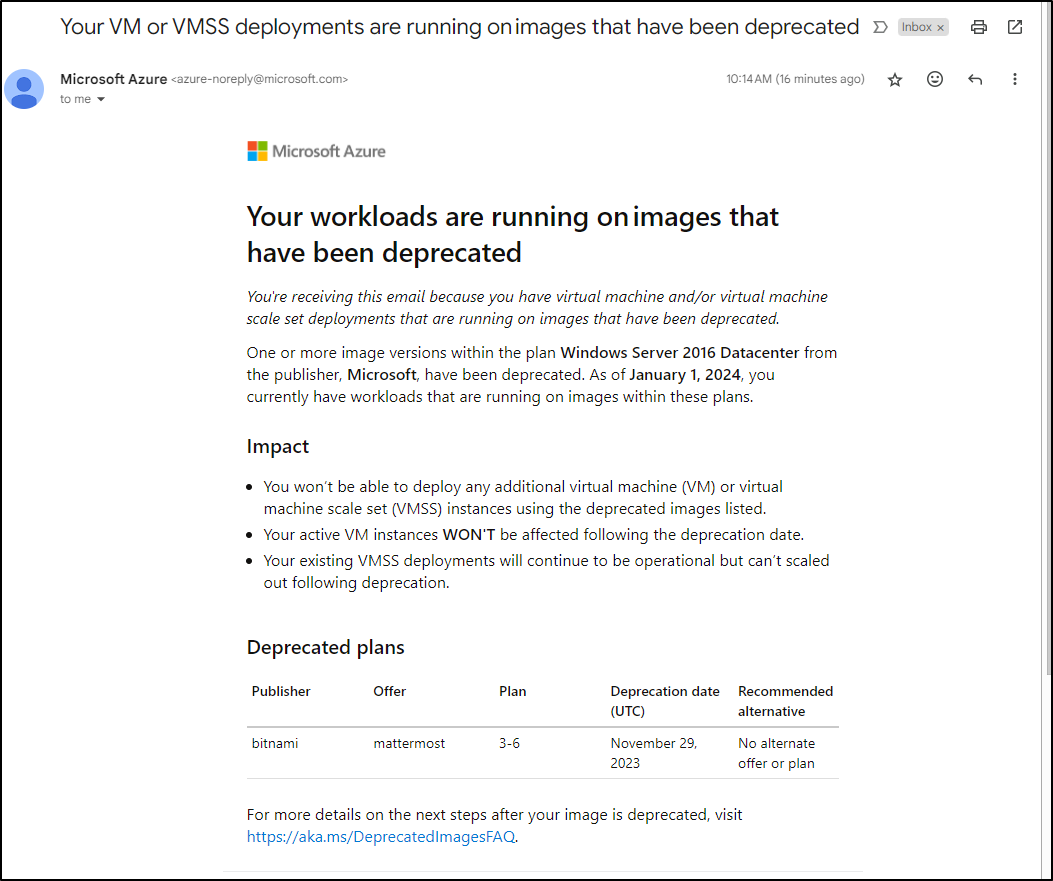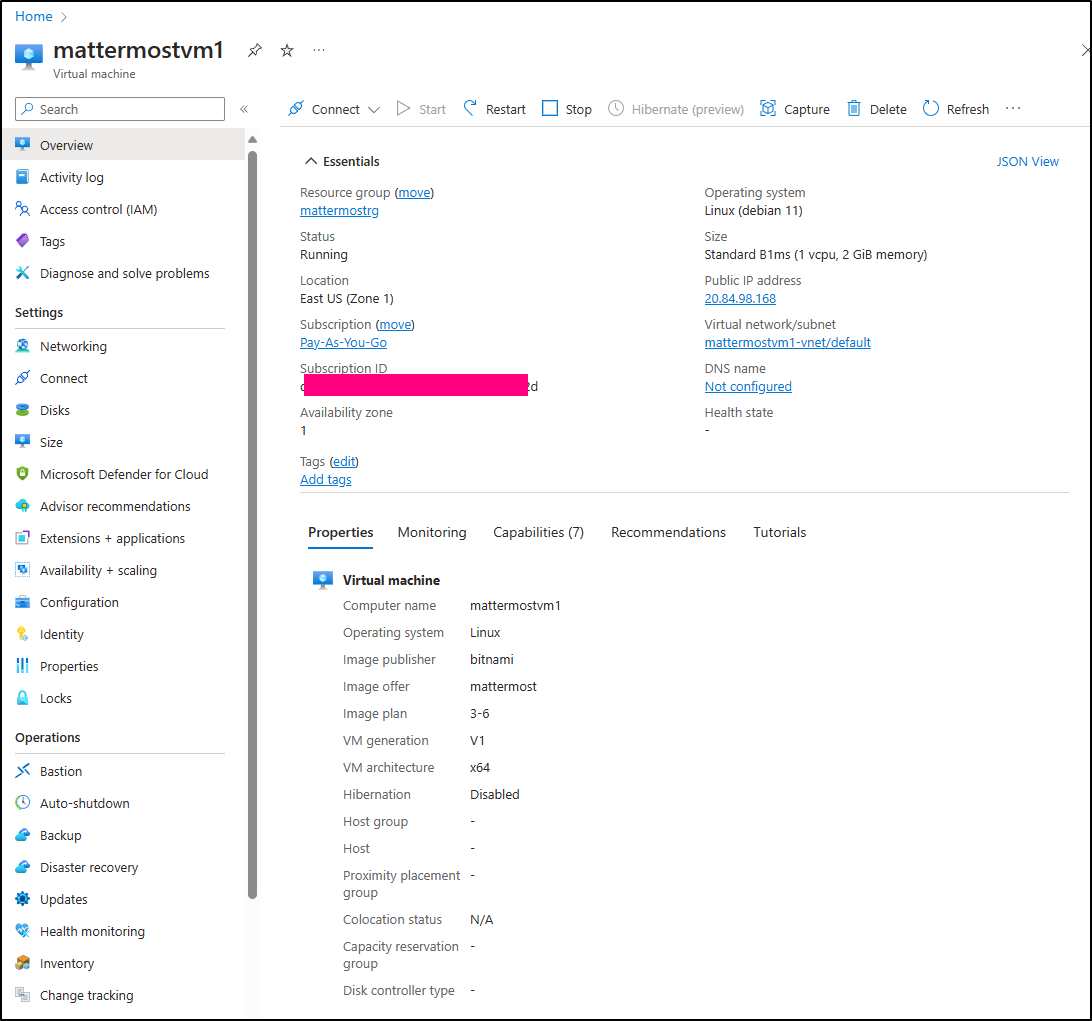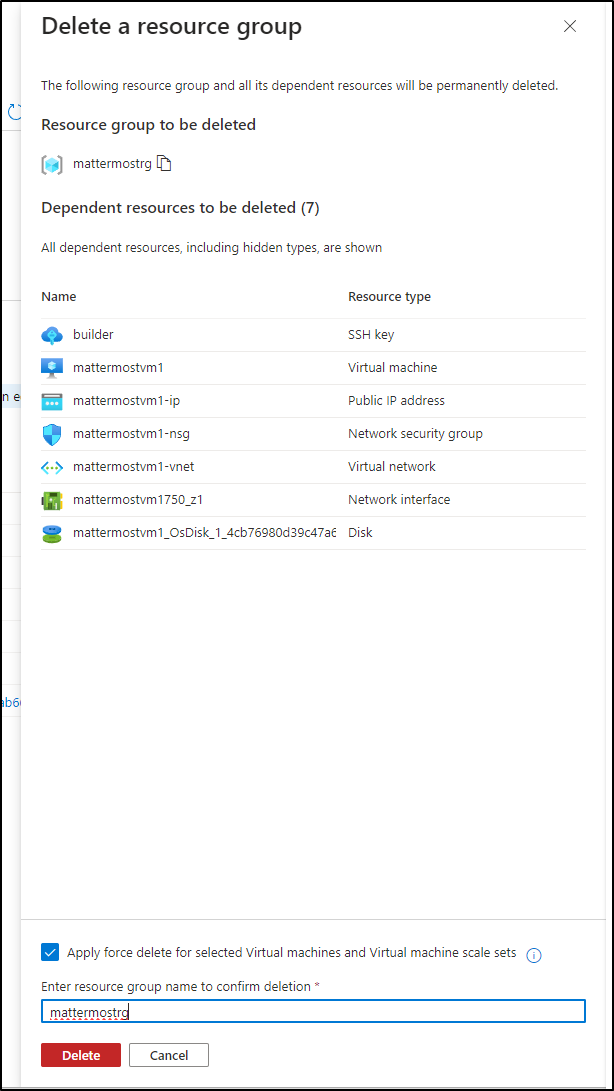Published: Jan 18, 2024 by Isaac Johnson
I actually came across Mattermost while exploring an Open-Source deployment toolset. While the toolset didn’t work out, I found Mattermost a compelling offering. It’s a self-hosted toolset that can run in Docker, Kubernetes, Ubuntu or the Cloud (via canned Bitnami marketplace items in AWS, Azure and GCP).
We’ll explore Docker and Kubernetes then touch on “cloud” via the Bitnami stack in Azure.
Mattermost in Docker
Let’s start with the simple Dockerfile version. I can pull and run the “preview” image in my Docker host.
builder@builder-T100:~$ docker run --name mattermost-preview -d --publish 8065:8065 mattermost/mattermost-preview
Unable to find image 'mattermost/mattermost-preview:latest' locally
latest: Pulling from mattermost/mattermost-preview
af107e978371: Already exists
161c4a1c9e47: Pull complete
068ec7aef1c0: Pull complete
84cb495413f5: Pull complete
4b9c266e38bb: Pull complete
abf3132b55e3: Pull complete
61755c2bbafa: Pull complete
dcc6b87767cd: Pull complete
844bb6ff3ef2: Pull complete
ee304895c401: Pull complete
1a107841a059: Pull complete
69b04a3aa964: Pull complete
0ea1f902e042: Pull complete
d36a0d8fbcc1: Pull complete
e33efdf41c62: Pull complete
18db8bc0c846: Pull complete
7d95738fb467: Pull complete
e4db57eba801: Pull complete
5961482dbd04: Pull complete
a1263977511e: Pull complete
98c090492600: Pull complete
57b9b92b3921: Pull complete
62fdbdd4379c: Pull complete
Digest: sha256:cc133a74724fc1e106d035ac1e6345ce1ba295faaca47612b634fba84f106ccb
Status: Downloaded newer image for mattermost/mattermost-preview:latest
c4f698e8b3778a3998d641df224f1d09a2f0c58fae8924cac148feda62d4cbe4
On port 8065, I can now see it show up in the browser
I chose to use the webapp and it wanted a user signup
Next, I created an Organization
I was prompted on tools we use
It then gave me a link others could use (I guess provided they are in my network; http://192.168.1.100:8065/signup_user_complete/?id=ccd8n8hd3t8htg7i3pagf7jr4a)
I then landed in a something very Slack-like
I figured I would start with Playbooks. I picked “Incident Resolution” from the list mostly because I dig the dumpster fire icon
There is a lot to unpack here:
Some features are clearly free, like adding on-call from a pick list of users
Others, like “Add a Timeframe” pop up a “pay me” dialogue
There is some legitimately cool stuff here such as auto-creating a channel on Incident and providing a Welcome message to those jumping in to help
Let’s try a test
I immediately see I was added to the channel and updates are due within the hour
I can now post an update
I can click in the upper right to change settings, like severity or incident commander
We can add in ideas that we can discuss and check off
It wasn’t keen on me starting a call since we were doing http
I can post an update that the problem is wrapped up
It will want confirmation about the unfinished tasks first
And now we see it is completed
I can now leave the channel
Note, even though I left the channel I can still go back to review what happened. If we go to Playbooks, we can view finished playbooks
And from there get a breakdown of what happened and when (and by whom)
System settings
If we pop over to the system console, it’s a very long left-hand Navigation
Some things, like file storage are just local file system or S3
However, I can always use a GCS HMAC endpoint (see example) or MinIO with GCS bucket backing if I wanted to expose Google Cloud storage or expose with Minio on my NAS.
The docs suggest we have other choices but I have yet to see them
There are some settings, like the database, that are only changeable via files on the host.
I’ve had my fun but I think I’ll stop this instance in Docker to try Kubernetes instead
builder@builder-T100:~$ docker ps
CONTAINER ID IMAGE COMMAND CREATED STATUS PORTS NAMES
c4f698e8b377 mattermost/mattermost-preview "/bin/sh -c ./docker…" 8 hours ago Up 8 hours 5432/tcp, 0.0.0.0:8065->8065/tcp, :::8065->8065/tcp mattermost-preview
builder@builder-T100:~$ docker stop mattermost-preview
mattermost-preview
builder@builder-T100:~$ docker rm mattermost-preview
mattermost-preview
Kubernetes
We can follow their Kubernetes Install Guide which involves an operator, database setup, configuration files then instantiation of the operator.
While I know the ingress wont sort out in my test K8s, I want to see what this does first.
We’ll first create a namespace and install the operator
$ kubectl create ns mattermost-operator
namespace/mattermost-operator created
$ kubectl apply -n mattermost-operator -f https://raw.githubusercontent.com/mattermost/mattermost-operator/master/docs/mattermost-operator/mattermost-operator.yaml
customresourcedefinition.apiextensions.k8s.io/clusterinstallations.mattermost.com created
customresourcedefinition.apiextensions.k8s.io/mattermostrestoredbs.mattermost.com created
customresourcedefinition.apiextensions.k8s.io/mattermosts.installation.mattermost.com created
serviceaccount/mattermost-operator created
clusterrole.rbac.authorization.k8s.io/mattermost-operator created
clusterrolebinding.rbac.authorization.k8s.io/mattermost-operator created
service/mattermost-operator created
deployment.apps/mattermost-operator created
I’m going to use a utility box for the database for now
builder@builder-HP-EliteBook-745-G5:~$ sudo -u postgres psql
psql (12.17 (Ubuntu 12.17-0ubuntu0.20.04.1))
Type "help" for help.
postgres=# create database mattermost;
CREATE DATABASE
postgres=# create user mattermost with encrypted password 'matterpass';
CREATE ROLE
postgres=# grant all privileges on database mattermost to mattermost;
GRANT
postgres=# \q
By default, Postgres is on port 5432, but we can validate that
$ pg_lsclusters
Ver Cluster Port Status Owner Data directory Log file
12 main 5432 online postgres /var/lib/postgresql/12/main /var/log/postgresql/postgresql-12-main.log
I can now create a secret using that host, user, pass and db
$ echo postgres://mattermost:matterpass@192.168.1.33:5432/mattermost | base64 -w 0
cG9zdGdyZXM6Ly9tYXR0ZXJtb3N0Om1hdHRlcnBhc3NAMTkyLjE2OC4xLjMzOjU0MzIvbWF0dGVybW9zdAo=
I’ll now use that in the database settings we will need
$ cat ./my-postgres-connection.yaml
apiVersion: v1
data:
DB_CONNECTION_CHECK_URL: cG9zdGdyZXM6Ly9tYXR0ZXJtb3N0Om1hdHRlcnBhc3NAMTkyLjE2OC4xLjMzOjU0MzIvbWF0dGVybW9zdAo=
DB_CONNECTION_STRING: cG9zdGdyZXM6Ly9tYXR0ZXJtb3N0Om1hdHRlcnBhc3NAMTkyLjE2OC4xLjMzOjU0MzIvbWF0dGVybW9zdAo=
MM_SQLSETTINGS_DATASOURCEREPLICAS: cG9zdGdyZXM6Ly9tYXR0ZXJtb3N0Om1hdHRlcnBhc3NAMTkyLjE2OC4xLjMzOjU0MzIvbWF0dGVybW9zdAo=
kind: Secret
metadata:
name: my-postgres-connection
type: Opaque
For S3 items, we need an access and secret.
$ cat my-s3-iam-access-key.yaml
apiVersion: v1
data:
accesskey: QUtJQUFBQkJDQ0RERUVGRkdHSEgK
secretkey: QUJDRGFiY2RFRkdIZWZnaEhJSmhpaktMTWtsbU5PUG5vcFFSU3Fycwo=
kind: Secret
metadata:
name: my-s3-iam-access-key
type: Opaque
I need to create a namespace and add both the database and AWS secrets there
builder@DESKTOP-QADGF36:~/Workspaces/mattermost$ kubectl create ns mattermost
namespace/mattermost created
builder@DESKTOP-QADGF36:~/Workspaces/mattermost$ kubectl apply -f my-s3-iam-access-key.yaml -n mattermost
secret/my-s3-iam-access-key created
builder@DESKTOP-QADGF36:~/Workspaces/mattermost$ kubectl apply -f my-postgres-connection.yaml -n mattermost
secret/my-postgres-connection created
Then, I’ll create an S3 bucket to use for storage
$ aws s3 mb s3://mymattermost
make_bucket: mymattermost
Only because I assumed which AWS account I was using, I also double checked it was created via the AWS console
We can now update the mattermost-installation yaml to reference the PG connection, AWS Secrets and our bucket name
$ cat mattermost-installation.yaml
apiVersion: installation.mattermost.com/v1beta1
kind: Mattermost
metadata:
name: mm-freshbrewed
spec:
size: 1000users # Adjust to your requirements
ingress:
enabled: true
host: mattermost.freshbrewed.science
annotations:
kubernetes.io/ingress.class: nginx
version: 6.0.1
licenseSecret: ""
database:
external:
secret: my-postgres-connection
fileStore:
external:
url: s3.amazonaws.com
bucket: mymattermost
secret: my-s3-iam-access-key
mattermostEnv:
- name: MM_FILESETTINGS_AMAZONS3SSE
value: "true"
- name: MM_FILESETTINGS_AMAZONS3SSL
value: "true"
Now just apply it and hope the operator takes care of the rest
$ kubectl apply -n mattermost -f mattermost-installation.yaml
mattermost.installation.mattermost.com/mm-freshbrewed created
We can check the status
$ kubectl -n mattermost get mm -w
NAME STATE IMAGE VERSION ENDPOINT
mm-freshbrewed reconciling
I have it a good 30m to see if something would come up
All I got was
$ kubectl describe mm -n mattermost
Name: mm-freshbrewed
Namespace: mattermost
Labels: <none>
Annotations: <none>
API Version: installation.mattermost.com/v1beta1
Kind: Mattermost
Metadata:
Creation Timestamp: 2023-12-30T19:26:26Z
Generation: 2
Resource Version: 10235440
UID: 8cd3b1d2-55cb-42a8-9ba9-2a506b245fe4
Spec:
Database:
External:
Secret: my-postgres-connection
Elastic Search:
File Store:
External:
Bucket: mymattermost
Secret: my-s3-iam-access-key
URL: s3.amazonaws.com
Image: mattermost/mattermost-enterprise-edition
Image Pull Policy: IfNotPresent
Ingress:
Annotations:
kubernetes.io/ingress.class: nginx
Enabled: true
Host: mattermost.freshbrewed.science
Ingress Name:
Mattermost Env:
Name: MM_FILESETTINGS_AMAZONS3SSE
Value: true
Name: MM_FILESETTINGS_AMAZONS3SSL
Value: true
Pod Extensions:
Probes:
Liveness Probe:
Readiness Probe:
Replicas: 2
Scheduling:
Resources:
Limits:
Cpu: 2
Memory: 4Gi
Requests:
Cpu: 150m
Memory: 256Mi
Version: 6.0.1
Status:
Observed Generation: 2
Replicas: 2
State: reconciling
Events: <none>
Looking into the crashed pods
$ kubectl get pods -n mattermost
NAME READY STATUS RESTARTS AGE
mm-freshbrewed-669697fd97-lzhxl 0/1 CrashLoopBackOff 12 (2m26s ago) 39m
mm-freshbrewed-669697fd97-trhqp 0/1 CrashLoopBackOff 12 (110s ago) 39m
I noticed the error:
Message: Error: failed to load configuration: failed to initialize: failed to create Configurations table: parse "postgres://mattermost:matterpass@192.168.1.33:5432/mattermost\n": net/url: invalid control character in URL
Their examples had newlines which is why I went with them. Let’s strip out the newline with tr -d \n
builder@DESKTOP-QADGF36:~/Workspaces/mattermost$ echo postgres://mattermost:matterpass@192.168.1.33:5432/mattermost | tr -d '\n' | base64 -w 0
cG9zdGdyZXM6Ly9tYXR0ZXJtb3N0Om1hdHRlcnBhc3NAMTkyLjE2OC4xLjMzOjU0MzIvbWF0dGVybW9zdA==builder@DESKTOP-QADGF36:~/Workspaces/mattermost$
builder@DESKTOP-QADGF36:~/Workspaces/mattermost$
builder@DESKTOP-QADGF36:~/Workspaces/mattermost$ echo cG9zdGdyZXM6Ly9tYXR0ZXJtb3N0Om1hdHRlcnBhc3NAMTkyLjE2OC4xLjMzOjU0MzIvbWF0dGVybW9zdA== | base64 --decode
postgres://mattermost:matterpass@192.168.1.33:5432/mattermostbuilder@DESKTOP-QADGF36:~/Workspaces/mattermost$
I’ll apply and rotate the pods
builder@DESKTOP-QADGF36:~/Workspaces/mattermost$ kubectl apply -f my-postgres-connection.yaml -n mattermost
secret/my-postgres-connection configured
builder@DESKTOP-QADGF36:~/Workspaces/mattermost$ kubectl delete pods -l app=mattermost -n mattermost
pod "mm-freshbrewed-669697fd97-cbtkm" deleted
pod "mm-freshbrewed-669697fd97-rpvtx" deleted
builder@DESKTOP-QADGF36:~/Workspaces/mattermost$ kubectl get pods -n mattermost
NAME READY STATUS RESTARTS AGE
mm-freshbrewed-669697fd97-qflsj 0/1 Running 0 9s
mm-freshbrewed-669697fd97-7hlth 0/1 CrashLoopBackOff 1 (3s ago) 9s
Still seems unhappy
$ kubectl get pods -n mattermost
NAME READY STATUS RESTARTS AGE
mm-freshbrewed-669697fd97-7hlth 0/1 CrashLoopBackOff 1 (13s ago) 19s
mm-freshbrewed-669697fd97-qflsj 0/1 Error 1 (11s ago) 19s
I see a new error…
$ kubectl logs mm-freshbrewed-669697fd97-7hlth -n mattermost
Defaulted container "mattermost" out of: mattermost, init-check-database (init)
Error: failed to load configuration: failed to initialize: failed to create Configurations table: pq: no pg_hba.conf entry for host "192.168.1.159", user "mattermost", database "mattermost", SSL on
That one is actually my fault. I neglected to add all CIDRs for IPv4. My pg_hba.conf showed
# "local" is for Unix domain socket connections only
local all all peer
# IPv4 local connections:
host all all 127.0.0.1/32 md5
Which I changed to
# IPv4 local connections:
host all all 0.0.0.0/0 md5
Then a quick bounce of the database
$ sudo service postgresql restart
And then the pods
builder@DESKTOP-QADGF36:~/Workspaces/mattermost$ kubectl get pods -n mattermost
NAME READY STATUS RESTARTS AGE
mm-freshbrewed-669697fd97-7hlth 0/1 CrashLoopBackOff 5 (117s ago) 5m1s
mm-freshbrewed-669697fd97-qflsj 0/1 CrashLoopBackOff 5 (93s ago) 5m1s
builder@DESKTOP-QADGF36:~/Workspaces/mattermost$ kubectl delete pods -l app=mattermost -n mattermost
pod "mm-freshbrewed-669697fd97-7hlth" deleted
pod "mm-freshbrewed-669697fd97-qflsj" deleted
$ kubectl get pods -n mattermost
NAME READY STATUS RESTARTS AGE
mm-freshbrewed-669697fd97-khrjq 1/1 Running 0 31s
mm-freshbrewed-669697fd97-fdf84 1/1 Running 0 31s
I now see
$ kubectl -n mattermost get mm
NAME STATE IMAGE VERSION ENDPOINT
mm-freshbrewed stable mattermost/mattermost-enterprise-edition 6.0.1 mattermost.freshbrewed.science
I can see it created an ingress (albeit not working since this is a Traefik cluster without proper ingress setup)
$ kubectl get ingress --all-namespaces
NAMESPACE NAME CLASS HOSTS ADDRESS PORTS AGE
plane-ns my-plane-ingress nginx plane.example.com,plane-minio.example.com 80 13d
disabledtest mytest-pyk8sservice traefik pytestapp.local 192.168.1.13,192.168.1.159,192.168.1.206 80, 443 29h
mattermost mm-freshbrewed <none> mattermost.freshbrewed.science 80 8m42s
That said, I can port-forward to the service to get it setup
$ kubectl -n mattermost port-forward svc/mm-freshbrewed 8065:8065
Forwarding from 127.0.0.1:8065 -> 8065
Forwarding from [::1]:8065 -> 8065
Handling connection for 8065
Handling connection for 8065
Handling connection for 8065
Production Cluster
I felt mostly safe launching this into my production cluster. With my main cluster, we can get a real ingress and test with SSL.
My first thought was to use a solid HA NAS for the database. The docs suggest I can use MySQL (MariaDB) so I tried that first
I created a user on sirnasilot
MariaDB [(none)]> create user 'mmuser'@'%' identified by 'M4tt3rM0st@@@@';
Query OK, 0 rows affected (0.081 sec)
I then made the database and granted the user access
MariaDB [(none)]> create database mattermost;
Query OK, 1 row affected (0.010 sec)
MariaDB [(none)]> grant all privileges on mattermost.* to 'mmuser'@'%';
Query OK, 0 rows affected (0.502 sec)
MariaDB [(none)]> GRANT ALTER, CREATE, DELETE, DROP, INDEX, INSERT, SELECT, UPDATE, REFERENCES ON mattermost.* TO 'mmuser'@'%';
Query OK, 0 rows affected (0.198 sec)
The examples I saw out there suggested a DB String like:
mysql://mmuser:really_secure_password@tcp(127.0.0.1:3306)/mattermost?charset=utf8mb4,utf8&writeTimeout=30s
I switched users mostly because I didn’t know how to escape the @ in the password. So the new string might look like
mysql://matteruser:M4tttt3r-m0st@tcp(192.168.1.117:3306)/mattermost?charset=utf8mb4,utf8&writeTimeout=30s
I base64’ed it and set it as a password in the YAML my-database.yaml
Ingress
Like normal, we need to quick create an A Record for this host
$ cat r53-mattermost.yaml
{
"Comment": "CREATE mattermost fb.s A record ",
"Changes": [
{
"Action": "CREATE",
"ResourceRecordSet": {
"Name": "mattermost.freshbrewed.science",
"Type": "A",
"TTL": 300,
"ResourceRecords": [
{
"Value": "75.73.224.240"
}
]
}
}
]
}
$ aws route53 change-resource-record-sets --hosted-zone-id Z39E8QFU0F9PZP --change-batch file://r53-mattermost.yaml
{
"ChangeInfo": {
"Id": "/change/C03923801VZBK306NNJIW",
"Status": "PENDING",
"SubmittedAt": "2023-12-31T02:53:24.419Z",
"Comment": "CREATE mattermost fb.s A record "
}
}
Operator install
I’ll setup the operator
builder@LuiGi17:~/Workspaces/mattermost$ kubectl create ns mattermost-operator
namespace/mattermost-operator created
builder@LuiGi17:~/Workspaces/mattermost$ kubectl apply -n mattermost-operator -f https://raw.githubusercontent.com/mattermost/mattermost-operator/master/docs/mattermost-operator/mattermost-operator.yaml
customresourcedefinition.apiextensions.k8s.io/clusterinstallations.mattermost.com created
customresourcedefinition.apiextensions.k8s.io/mattermostrestoredbs.mattermost.com created
customresourcedefinition.apiextensions.k8s.io/mattermosts.installation.mattermost.com created
serviceaccount/mattermost-operator created
clusterrole.rbac.authorization.k8s.io/mattermost-operator created
clusterrolebinding.rbac.authorization.k8s.io/mattermost-operator created
service/mattermost-operator created
deployment.apps/mattermost-operator created
Installing
I created the AWS secret
$ kubectl apply -f /home/builder/Workspaces/mattermost/my-s3-iam-access-key.yaml -n mattermo
st
secret/my-s3-iam-access-key created
$ kubectl apply -f /home/builder/Workspaces/mattermost/my-database.yaml -n mattermost
secret/mattermost-db-secret created
Lastly, we bring it all-together to install
$ kubectl apply -f /home/builder/Workspaces/mattermost/mattermost-installation.yaml -n mattermost
mattermost.installation.mattermost.com/mm-freshbrewed created
I will spare you the many multiple attempts to get MariaDB working. I ended up going back to Postgres as I could not get mariadb auth to work.
$ kubectl apply -f mattermost-installation.yaml -n mattermost
mattermost.installation.mattermost.com/mm-freshbrewed configured
$ kubectl get pods -n mattermost
NAME READY STATUS RESTARTS AGE
mm-freshbrewed-f495b6754-n7rld 1/1 Running 0 64s
mm-freshbrewed-f495b6754-fnwmh 1/1 Running 0 38s
Operator Issues with NGinx Ingress
I fought TLS for a while. It seems the Operator just will not let me set the TLS block. Moreover, if I create manually, it’s overwritten. If I delete the errant one, it’s immediately restored.
In the end, I created the MM Installation without Ingress enabled:
$ cat mattermost-installation.yaml
apiVersion: installation.mattermost.com/v1beta1
kind: Mattermost
metadata:
name: mm-freshbrewed
spec:
size: 1000users # Adjust to your requirements
ingress:
enabled: false
host: mattermost.freshbrewed.science
annotations:
cert-manager.io/issuer: "letsencrypt-prod"
cert-manager.io/cluster-issuer: "letsencrypt-prod"
kubernetes.io/ingress.class: "nginx"
ingress.kubernetes.io/ssl-redirect: "true"
nginx.ingress.kubernetes.io/ssl-redirect: "true"
version: 6.0.1
licenseSecret: ""
database:
external:
secret: my-postgres-connection
fileStore:
external:
url: s3.amazonaws.com
bucket: mymattermost
secret: my-s3-iam-access-key
mattermostEnv:
- name: MM_FILESETTINGS_AMAZONS3SSE
value: "true"
- name: MM_FILESETTINGS_AMAZONS3SSL
value: "true"
Then applied the Ingress with TLS manually afterward
$ cat t.o
apiVersion: networking.k8s.io/v1
kind: Ingress
metadata:
annotations:
cert-manager.io/cluster-issuer: letsencrypt-prod
ingress.kubernetes.io/ssl-redirect: "true"
kubernetes.io/ingress.class: nginx
nginx.ingress.kubernetes.io/proxy-body-size: 1000M
nginx.ingress.kubernetes.io/ssl-redirect: "true"
labels:
app: mattermost
name: mm-freshbrewed
namespace: mattermost
spec:
rules:
- host: mattermost.freshbrewed.science
http:
paths:
- backend:
service:
name: mm-freshbrewed
port:
number: 8065
path: /
pathType: ImplementationSpecific
tls:
- hosts:
- mattermost.freshbrewed.science
secretName: mattermost-tls
$ kubectl apply -f t.o -n mattermost
ingress.networking.k8s.io/mm-freshbrewed created
We can now see it come up (spoiler - for a while… seems after some amount of time, it comes back and removes our ingress)
I’m curious if emails went out as I did not setup SMTP just yet
Checking a day later, still no email so I would assume SMTP needs to be set first.
Note: When you do setup SMTP, you have to “save” before you “test”, otherwise the “test” button tests the last saved settings.
I fixed the “From” address in Notification settings
Then fired a fresh invite. I could see in Resend a note that it was sent
And this time it was delivered
I kept searching for “calls” and couldn’t find it. I knew I saw a “call” feature in the Docker version. Upon looking at the Docs, it seems that is 7.0 feature.
Looking at the tags in Dockerhub, I think we are quite a bit behind as they are building version 9.4.0 Release Candidates and we went with 6.0.1.
It’s surprising to me that their public Install docs show such a dated version.
And on Dockerhub:
I plan to give ‘release-8.1’ a try
$ kubectl get mattermost -n mattermost
NAME STATE IMAGE VERSION ENDPOINT
mm-freshbrewed stable mattermost/mattermost-enterprise-edition 6.0.1 not available
$ kubectl edit mattermost -n mattermost
mattermost.installation.mattermost.com/mm-freshbrewed edited
$ kubectl get mattermost -n mattermost
NAME STATE IMAGE VERSION ENDPOINT
mm-freshbrewed reconciling mattermost/mattermost-enterprise-edition 6.0.1 not available
$ kubectl get mattermost -n mattermost
NAME STATE IMAGE VERSION ENDPOINT
mm-freshbrewed stable mattermost/mattermost-enterprise-edition release-8.1 not available
I tried to start a call
But it kept erroring
There seems to be some nuances about forwarding TCP and UDP traffic. I even tried to forward both
Another issue is that after a while, something erases my Ingress in the namespace. It’s almost like the operator catches up and deletes it
$ kubectl get ingress -n mattermost
No resources found in mattermost namespace.
This is a bit of a deal-breaker for me - I can’t just keep re-adding the Ingress and the current chart doesn’t properly setup annotations for TLS. I’m not going to host a service with logins on HTTP.
Removal
Removing Mattermost is easy.
We check the ‘mattermost’ install in our namespace (or all namespaces)
$ kubectl get mattermost -n mattermost
NAME STATE IMAGE VERSION ENDPOINT
mm-freshbrewed stable mattermost/mattermost-enterprise-edition release-8.1 not available
Then just delete it
$ kubectl delete mattermost mm-freshbrewed -n mattermost
mattermost.installation.mattermost.com "mm-freshbrewed" deleted
We can easily verify the workloads are gone
$ kubectl delete mattermost -n mattermost
error: resource(s) were provided, but no name was specified
$ kubectl get pods -n mattermost
No resources found in mattermost namespace.
$ kubectl get svc -n mattermost
No resources found in mattermost namespace.
Cloud
Let’s try the Cloud offering
Which surprised me to find out just directs me to a Bitnami deploy
Which I can fire up in GCP
or Azure
In Azure, I can confirm the cost is just the VM as the package from Bitnami is $0/hour
When creating, I’ll store this in a new Resource Group (mattermostrg). I can also pick from a few VM sizes. I’ll go with Standard_B1ms at $15.11 month
I did say to delete the Public IP if the VM goes away. A real HA setup would leave the default, unchecked
In my review and create we can see it will be just over 2c an hour for the VM and probably a little bit more for network and disk, but that seems reasonable.
On create, it will prompt me to save the PEM
I got an error on first launch
I figured I would try the global debug of offnonagain
when completed
I was trying to login
$ ssh -i /home/builder/.ssh/builder.pem azureuser@20.84.98.168
Linux mattermostvm1 5.10.0-26-cloud-amd64 #1 SMP Debian 5.10.197-1 (2023-09-29) x86_64
The programs included with the Debian GNU/Linux system are free software;
the exact distribution terms for each program are described in the
individual files in /usr/share/doc/*/copyright.
Debian GNU/Linux comes with ABSOLUTELY NO WARRANTY, to the extent
permitted by applicable law.
___ _ _ _
| _ |_) |_ _ _ __ _ _ __ (_)
| _ \ | _| ' \/ _` | ' \| |
|___/_|\__|_|_|\__,_|_|_|_|_|
*** Welcome to the Bitnami package for Mattermost Team Edition 9.3.0-0 ***
*** Documentation: https://docs.bitnami.com/azure/apps/mattermost/ ***
*** https://docs.bitnami.com/azure/ ***
*** Bitnami Forums: https://github.com/bitnami/vms/ ***
bitnami@mattermostvm1:~$
when the site came up.. So we will just assume due to the small class size of the host, it just takes some time
This time the call worked
Sharing is kind of interesting in that I see a browser notification that I’m sharing that browser but in Mattermost, it’s a small live icon. Both let me stop sharing.
Let’s try and setup LE and a domain name. I created a quick A record for azdo.space
I saved it, but I’m not certain it took effect.
I can see it resolve, but the “Test Live URL” says it’s not valid
Bitnami steps to check services do not seem to work
bitnami@mattermostvm1:~$ sudo /opt/bitnami/ctlscript.sh status
Control file '/etc/gonit/gonitrc' does not exists
Even if I create the missing rc file
bitnami@mattermostvm1:~$ sudo /opt/bitnami/ctlscript.sh status mattermost
Cannot find any running daemon to contact. If it is running, make sure you are pointing to the right pid file (/var/run/gonit.pid)
There is no service either for systemctl
bitnami@mattermostvm1:~$ sudo systemctl restart mattermost
Failed to restart mattermost.service: Unit mattermost.service not found.
However, I can always do the old offnonagain
bitnami@mattermostvm1:~$ sudo reboot now
bitnami@mattermostvm1:~$ Connection to 20.84.98.168 closed by remote host.
Connection to 20.84.98.168 closed.
I gave it a solid 30m and still nothing
Meanwhile, while waiting for it to come up, I was surprised to see an email from Azure suggesting this chart was built on Windows 2016 DC
I wonder if it’s just a mistake as I can see the OS is Debian and SSH worked without issue
I went back onto the host and checked to see what was listening on 8065. I dove into the NGinx conf till I figured out Nginx just fronts everything over to mattermost locally
bitnami@mattermostvm1:/var/log$ cat /opt/bitnami/nginx/conf/server_blocks/mattermost-https-server-block.conf
upstream backend {
server 127.0.0.1:8065;
}
proxy_cache_path /opt/bitnami/nginx/tmp/cache levels=1:2 keys_zone=mattermost_cache:10m max_size=3g inactive=120m use_temp_path=off;
server {
# Port to listen on, can also be set in IP:PORT format
listen 443 ssl default_server;
root /opt/bitnami/mattermost;
# Catch-all server block
# See: https://nginx.org/en/docs/http/server_names.html#miscellaneous_names
server_name _;
ssl_certificate bitnami/certs/server.crt;
ssl_certificate_key bitnami/certs/server.key;
ssl_session_timeout 1d;
# Enable TLS versions (TLSv1.3 is required upcoming HTTP/3 QUIC).
ssl_protocols TLSv1.2 TLSv1.3;
# Enable TLSv1.3's 0-RTT. Use $ssl_early_data when reverse proxying to
# prevent replay attacks.
#
# @see: https://nginx.org/en/docs/http/ngx_http_ssl_module.html#ssl_early_data
ssl_early_data on;
ssl_ciphers 'ECDHE-ECDSA-AES256-GCM-SHA384:ECDHE-RSA-AES256-GCM-SHA384:ECDHE-ECDSA-CHACHA20-POLY1305:ECDHE-RSA-CHACHA20-POLY1305:ECDHE-ECDSA-AES128-GCM-SHA256:ECDHE-RSA-AES128-GCM-SHA256:ECDHE-ECDSA-AES256-SHA384:ECDHE-RSA-AES256-SHA384:ECDHE-ECDSA-AES128-SHA256:ECDHE-RSA-AES128-SHA256';
ssl_prefer_server_ciphers on;
ssl_session_cache shared:SSL:50m;
# HSTS (ngx_http_headers_module is required) (15768000 seconds = 6 months)
add_header Strict-Transport-Security max-age=15768000;
# OCSP Stapling ---
# fetch OCSP records from URL in ssl_certificate and cache them
#ssl_stapling on;
#ssl_stapling_verify on;
location ~ /api/v[0-9]+/(users/)?websocket$ {
proxy_set_header Upgrade $http_upgrade;
proxy_set_header Connection "upgrade";
client_max_body_size 50M;
proxy_set_header Host $http_host;
proxy_set_header X-Real-IP $remote_addr;
proxy_set_header X-Forwarded-For $proxy_add_x_forwarded_for;
proxy_set_header X-Forwarded-Proto $scheme;
proxy_set_header X-Frame-Options SAMEORIGIN;
proxy_buffers 256 16k;
proxy_buffer_size 16k;
client_body_timeout 60;
send_timeout 300;
lingering_timeout 5;
proxy_connect_timeout 90;
proxy_send_timeout 300;
proxy_read_timeout 90s;
proxy_http_version 1.1;
proxy_pass http://backend;
}
location / {
client_max_body_size 50M;
proxy_set_header Connection "";
proxy_set_header Host $http_host;
proxy_set_header X-Real-IP $remote_addr;
proxy_set_header X-Forwarded-For $proxy_add_x_forwarded_for;
proxy_set_header X-Forwarded-Proto $scheme;
proxy_set_header X-Frame-Options SAMEORIGIN;
proxy_buffers 256 16k;
proxy_buffer_size 16k;
proxy_read_timeout 600s;
proxy_cache mattermost_cache;
proxy_cache_revalidate on;
proxy_cache_min_uses 2;
proxy_cache_use_stale timeout;
proxy_cache_lock on;
proxy_http_version 1.1;
proxy_pass http://backend;
}
include "/opt/bitnami/nginx/conf/bitnami/*.conf";
}
And nothing is listening on 8065 now
bitnami@mattermostvm1:/var/log$ sudo netstat -tulpn | grep LISTEN
tcp 0 0 0.0.0.0:443 0.0.0.0:* LISTEN 686/nginx: master p
tcp 0 0 127.0.0.1:3306 0.0.0.0:* LISTEN 704/mysqld
tcp 0 0 0.0.0.0:80 0.0.0.0:* LISTEN 686/nginx: master p
tcp 0 0 0.0.0.0:22 0.0.0.0:* LISTEN 1589/sshd: /usr/sbi
tcp6 0 0 :::33060 :::* LISTEN 704/mysqld
tcp6 0 0 :::22 :::* LISTEN 1589/sshd: /usr/sbi
Doing a start hung at the Mattermost step
bitnami@mattermostvm1:/etc/init.d$ sudo /etc/init.d/bitnami start
## 2024-01-01 16:38:32+00:00 ## INFO ## Running /opt/bitnami/var/init/pre-start/010_wait_waagent...
## 2024-01-01 16:38:32+00:00 ## INFO ## Running /opt/bitnami/var/init/pre-start/020_wait_until_mnt_mounted...
## 2024-01-01 16:38:32+00:00 ## INFO ## Running /opt/bitnami/var/init/pre-start/030_resize_fs...
resize2fs 1.46.2 (28-Feb-2021)
The filesystem is already 7831547 (4k) blocks long. Nothing to do!
## 2024-01-01 16:38:32+00:00 ## INFO ## Running /opt/bitnami/var/init/pre-start/040_hostname...
## 2024-01-01 16:38:32+00:00 ## INFO ## Running /opt/bitnami/var/init/pre-start/050_swap_file...
## 2024-01-01 16:38:32+00:00 ## INFO ## Running /opt/bitnami/var/init/pre-start/060_get_default_passwords...
## 2024-01-01 16:38:32+00:00 ## INFO ## Starting services...
2024-01-01T16:38:32.748Z - info: Saving configuration info to disk
2024-01-01T16:38:32.975Z - info: Performing service start operation for nginx
nginx 16:38:33.14 INFO ==> nginx is already running
2024-01-01T16:38:33.146Z - info: Performing service start operation for mysql
mysql 16:38:33.28 INFO ==> mysql is already running
2024-01-01T16:38:33.282Z - info: Performing service start operation for mattermost
I tried again
bitnami@mattermostvm1:/opt/bitnami$ sudo /opt/bitnami/ctlscript.sh start
Starting services..
Job for bitnami.service failed because the control process exited with error code.
See "systemctl status bitnami.service" and "journalctl -xe" for details.
bitnami@mattermostvm1:/opt/bitnami$ journalctl -xe
Jan 01 16:47:04 mattermostvm1 systemd[1]: This usually indicates unclean termination of a previous run, or service implementation deficiencies.
Jan 01 16:47:04 mattermostvm1 systemd[1]: bitnami.service: Found left-over process 689 (nginx) in control group while starting unit. Ignoring.
Jan 01 16:47:04 mattermostvm1 systemd[1]: This usually indicates unclean termination of a previous run, or service implementation deficiencies.
Jan 01 16:47:04 mattermostvm1 systemd[1]: bitnami.service: Found left-over process 690 (nginx) in control group while starting unit. Ignoring.
Jan 01 16:47:04 mattermostvm1 systemd[1]: This usually indicates unclean termination of a previous run, or service implementation deficiencies.
Jan 01 16:47:04 mattermostvm1 systemd[1]: bitnami.service: Found left-over process 704 (mysqld) in control group while starting unit. Ignoring.
Jan 01 16:47:04 mattermostvm1 systemd[1]: This usually indicates unclean termination of a previous run, or service implementation deficiencies.
Jan 01 16:47:04 mattermostvm1 bitnami[2408]: ## 2024-01-01 16:47:04+00:00 ## INFO ## Running /opt/bitnami/var/init/pre-start/010_wait_waagent...
Jan 01 16:47:04 mattermostvm1 systemd[1]: Starting LSB: bitnami init script...
░░ Subject: A start job for unit bitnami.service has begun execution
░░ Defined-By: systemd
░░ Support: https://www.debian.org/support
░░
░░ A start job for unit bitnami.service has begun execution.
░░
░░ The job identifier is 485.
Jan 01 16:47:04 mattermostvm1 bitnami[2408]: ## 2024-01-01 16:47:04+00:00 ## INFO ## Running /opt/bitnami/var/init/pre-start/020_wait_until_mnt_mounted...
Jan 01 16:47:04 mattermostvm1 bitnami[2408]: ## 2024-01-01 16:47:04+00:00 ## INFO ## Running /opt/bitnami/var/init/pre-start/030_resize_fs...
Jan 01 16:47:04 mattermostvm1 bitnami[2408]: resize2fs 1.46.2 (28-Feb-2021)
Jan 01 16:47:04 mattermostvm1 bitnami[2408]: The filesystem is already 7831547 (4k) blocks long. Nothing to do!
Jan 01 16:47:04 mattermostvm1 bitnami[2408]: ## 2024-01-01 16:47:04+00:00 ## INFO ## Running /opt/bitnami/var/init/pre-start/040_hostname...
Jan 01 16:47:04 mattermostvm1 bitnami[2408]: ## 2024-01-01 16:47:04+00:00 ## INFO ## Running /opt/bitnami/var/init/pre-start/050_swap_file...
Jan 01 16:47:04 mattermostvm1 bitnami[2408]: ## 2024-01-01 16:47:04+00:00 ## INFO ## Running /opt/bitnami/var/init/pre-start/060_get_default_passwords...
Jan 01 16:47:04 mattermostvm1 bitnami[2404]: ## 2024-01-01 16:47:04+00:00 ## INFO ## Starting services...
Jan 01 16:47:05 mattermostvm1 bitnami[2478]: 2024-01-01T16:47:05.236Z - info: Saving configuration info to disk
Jan 01 16:47:05 mattermostvm1 bitnami[2478]: 2024-01-01T16:47:05.472Z - info: Performing service start operation for nginx
Jan 01 16:47:05 mattermostvm1 bitnami[2478]: nginx 16:47:05.65 INFO ==> nginx is already running
Jan 01 16:47:05 mattermostvm1 bitnami[2478]: 2024-01-01T16:47:05.656Z - info: Performing service start operation for mysql
Jan 01 16:47:05 mattermostvm1 bitnami[2478]: mysql 16:47:05.79 INFO ==> mysql is already running
Jan 01 16:47:05 mattermostvm1 bitnami[2478]: 2024-01-01T16:47:05.798Z - info: Performing service start operation for mattermost
Jan 01 16:47:15 mattermostvm1 dhclient[440]: XMT: Solicit on eth0, interval 120540ms.
Jan 01 16:49:15 mattermostvm1 dhclient[440]: XMT: Solicit on eth0, interval 112850ms.
Jan 01 16:49:45 mattermostvm1 bitnami[2478]: 2024-01-01T16:49:45.042Z - error: Unable to perform start operation Export start for mattermost failed with exit code 1
Jan 01 16:49:45 mattermostvm1 bitnami[2707]: ## 2024-01-01 16:49:45+00:00 ## INFO ## Running /opt/bitnami/var/init/post-start/010_detect_new_account...
Jan 01 16:49:45 mattermostvm1 bitnami[2707]: ## 2024-01-01 16:49:45+00:00 ## INFO ## Running /opt/bitnami/var/init/post-start/020_bitnami_agent_extra...
Jan 01 16:49:45 mattermostvm1 bitnami[2707]: ## 2024-01-01 16:49:45+00:00 ## INFO ## Running /opt/bitnami/var/init/post-start/030_bitnami_agent...
Jan 01 16:49:45 mattermostvm1 bitnami[2707]: ## 2024-01-01 16:49:45+00:00 ## INFO ## Running /opt/bitnami/var/init/post-start/040_update_welcome_file...
Jan 01 16:49:45 mattermostvm1 bitnami[2707]: ## 2024-01-01 16:49:45+00:00 ## INFO ## Running /opt/bitnami/var/init/post-start/050_bitnami_credentials_file...
Jan 01 16:49:45 mattermostvm1 bitnami[2707]: ## 2024-01-01 16:49:45+00:00 ## INFO ## Running /opt/bitnami/var/init/post-start/060_clean_metadata...
Jan 01 16:49:45 mattermostvm1 systemd[1]: bitnami.service: Control process exited, code=exited, status=1/FAILURE
░░ Subject: Unit process exited
░░ Defined-By: systemd
░░ Support: https://www.debian.org/support
░░
░░ An ExecStart= process belonging to unit bitnami.service has exited.
░░
░░ The process' exit code is 'exited' and its exit status is 1.
Jan 01 16:49:45 mattermostvm1 systemd[1]: bitnami.service: Failed with result 'exit-code'.
░░ Subject: Unit failed
░░ Defined-By: systemd
░░ Support: https://www.debian.org/support
░░
░░ The unit bitnami.service has entered the 'failed' state with result 'exit-code'.
Jan 01 16:49:45 mattermostvm1 sudo[2395]: pam_unix(sudo:session): session closed for user root
Jan 01 16:49:45 mattermostvm1 systemd[1]: bitnami.service: Unit process 686 (nginx) remains running after unit stopped.
Jan 01 16:49:45 mattermostvm1 systemd[1]: bitnami.service: Unit process 689 (nginx) remains running after unit stopped.
Jan 01 16:49:45 mattermostvm1 systemd[1]: bitnami.service: Unit process 690 (nginx) remains running after unit stopped.
Jan 01 16:49:45 mattermostvm1 systemd[1]: bitnami.service: Unit process 704 (mysqld) remains running after unit stopped.
Jan 01 16:49:45 mattermostvm1 systemd[1]: Failed to start LSB: bitnami init script.
░░ Subject: A start job for unit bitnami.service has failed
░░ Defined-By: systemd
░░ Support: https://www.debian.org/support
░░
░░ A start job for unit bitnami.service has finished with a failure.
░░
░░ The job identifier is 485 and the job result is failed.
Jan 01 16:49:45 mattermostvm1 systemd[1]: bitnami.service: Consumed 32.682s CPU time.
░░ Subject: Resources consumed by unit runtime
░░ Defined-By: systemd
░░ Support: https://www.debian.org/support
░░
░░ The unit bitnami.service completed and consumed the indicated resources.
bitnami@mattermostvm1:/opt/bitnami$ cat /opt/bitnami/var/init/post-start/060_clean_metadata
#!/bin/sh
# Copyright VMware, Inc.
# SPDX-License-Identifier: APACHE-2.0
#
# Bitnami Clean metadata files after initialization completes
#
. /opt/bitnami/scripts/init/functions
run_once_globally_check "clean_metadata"
if [ $? -ne 0 ]; then
exit 0
fi
# remove metadata password
set_stored_data metadata_applications_password ""
set_stored_data metadata_system_passsudo systemctl disable apache2.serviceami
$ sudo systemctl disable apache2.service
Failed to disable unit: Unit file apache2.service does not exist.
Cleanup
I’m done messing with this Azure host. I deleted but just removing the Resource Group
Comparison with Matrix Synapse
I can see video calls work with Element (Matrix). I’ve written about Matrix Synapse and Element, which provides a client, Web and Mobile, to Matrix. It’s part of the Fediverse. While it is slightly more complicated to think through Fediverse and Fediramp - basically we are creating a sort of global decentralized platform. The fact is, it is really easy to provide the chat, meeting room, and video call features in something that is open and free.
Here is a terrible visage of my unkempt mug over holiday break calling myself using Element on Android and Element on the web using different accounts:
While in the call, I can see screenshare works there too
So, if the video calling feature really is a deal-breaker, one can use something like Zoom, Element, Teams, Meet (or whatever Google calls their chat service this month).
Pricing
The current pricing is $120/user/year for Professional and “ask me” for Enterprise
I should note they do have a non-profit program that will grant a 3y license for $250:
Company
Mattermost was founded in 2016 by Corey Hulen and Ian Tien, Mattermost offers a suite of workflow-centric tools that integrate team messaging, audio and screen share, workflow automation and project management. Corey and Ian both worked at Microsoft between 2004 and 2008 but both have lead successful prior startups.
Mattermost is headquartered in Palo Alto, California, and operates as a remote-first company with a global team of 100 to 250 (Pitchbook says 159 which lines up with LinkedIn)
Summary
It’s an interesting product. I expected some form of SaaS/Cloud but really it is just a host-it-yourself software production that links to some canned playbooks in cloud providers.
It has a lot going for it with playbooks. I can see a full implementation being great for an Ops or SRE team. The ability to direct the flow seems perfect for a NOC.
For me, however, I’m not wild on the limited Kubernetes deployment. I might come back for a helm chart or an updated Operator with better Ingress support.


